#The Philadelphia Story is my favorite Katharine Hepburn movie ever
Explore tagged Tumblr posts
Text
January 2024 Writing Prompts
I'm going to do things differently this year. There is no main prompt for the month. I picked out several of last year's main prompts and put them in with the rest of my creative writing prompts, so we might see them again. Mostly, my goal this year is to work on any of my WIPs (there are so many of them ...).
But, I will post two writing prompts and a TV quote and a movie quote like I did last year.
WRITING PROMPT 1: Person A: I love this. / Person B: What? / Person A: Us.
WRITING PROMPT 2: "I've seen you flirt with anyone at the drop of a hat, but this time you froze." They grinned at their friend, brimming with excitement. "You actually caught feelings!" / "I don't know! Maybe? Shut up!"
TV QUOTE: Paul Buchman: All I know is I want to wake up naked with you for the rest of my life. (Mad About You)
MOVIE QUOTE: Tracy Lord: I'm going crazy. I'm standing here solidly on my own two hands and going crazy. (The Philadelphia Story)
NOTE: The TV and movie quotes can be used out of context from their original source.
NOTE: Like last year, all creative writing prompts come from other sources. They could be from a couple books I got from the library a while back, prompt books I bought, from googling and some websites, some from my own head, and from various tumblr sources (mostly @creativepromptsforwriting because there are some damn good ones there)
#January writing prompts#writing#creative writing#tv quotes#movie quotes#fanfiction#The Philadelphia Story is my favorite Katharine Hepburn movie ever#Katharine Hepburn could do no wrong here
4 notes
·
View notes
Text
LAST POLL OF ROUND 4


Katharine Hepburn and Cary Grant (Holiday, Bringing Up Baby, The Philadelphia Story)—They're both unspeakably hot and putting them together only makes them that much hotter. Because physically attractive people are WAY hotter when they're also incredibly funny, and both of them are. They play off each other to perfection, and I could eat them both ❤️
Christopher Lee and Peter Cushing (The Curse of Frankenstein, The Horror of Dracula)—Obviously never canon romantic but the definition of toxic old man yaoi. Whether it's the look on Lee's face as Dracula about to bite Van Helsing in "Horror Of Dracula" (1958) or Cushing destroying his life and engagement to create Lee's monster in "Curse Of Frankenstein" (1957). Such a popular team that the "Dracula" sequel lifted their final fight from the original and used it as a prologue even though Cushing isn't in the rest of the film.
This is round 4 of a mini tournament. Each poll lasts for a week. Please reblog with propaganda for your favorite hot couple. To vote in all the polls, click here.
[additional propaganda submitted under the cut]
Hepburn and Grant:

Truly two of the hottest people ever to grace our screens and when you put them together, it's volcanic. They are totally magnetic on screen together, with the perfect love/hate chemistry. The ultimate 'you drive me crazy' couple, no one is doing it like them.

They are delight and joy and ALSO insanely hot together. Friendships have ended over the ship war of The Philadelphia Story, and you know what? Valid.

They are the hottest couple because they are clever, witty and beautiful. They spark off each other magnificently.

I feel like they’re almost too obvious to bother submitting but I’ve made that mistake before so Cary Grant and Katherine Hepburn. I present Bringing Up Baby and The Philadelphia Story as evidence, your honor

Perfect onscreen match in some of the greatest romcoms ever. My, they were yar!

Cary Grant & Katherine Hepburn! They're my favorites! Dapper & ridiculous both!

I'm sorry, that's not a very romantic pic, but I had to include the serenading the leopard
and the fluffy bathrobe!
youtube
Peter Cushing and Christopher Lee:
Not exactly propaganda but I received this ask after Cushing and Lee's submission:
oh, I completely missed the qualifiers for the couples poll! Nevemind. Unless we count characters attempting to murder one another in multiple movies as peak couple behavior, Cushing and Lee tragically don’t qualify.
Editor's note: in this case I'll absolutely count that as romantic.
245 notes
·
View notes
Note
Hi! Do you have any romcom (movie) recs? I feel like i hypothetically like the genre, but have a lot of trouble finding ones i enjoy. So many romcoms feel so formulaic (in a dead way) and misogynistic and stale to me. I think they’re a lot easier to do well in the context of a series because there’s actually time to build. Recently i thought rye lane and fire island were fun. I like kdramas when i have the time for all the episodes because i appreciate the build. I need chemistry— people who both convincingly like each other and seem like actual human beings. I thought you might have some good ideas! Thanks <3
HELLO LARGE VOICED ANON <3
I hope you weren't waiting on my recs all day haha i have been. hm. hungover af <3 (i'm going to leave kdramas off this list for now but if you would like specific recs for kdrama romcoms send me another ask and i can try to do them justice!)
I think this is a genre with underrated range! So one thing that I find very interesting about the genre of romcoms is that I think there tends to be a split between romcoms whose goal is, like, to be a fun lighthearted movie with a central romance, vs romcoms whose goal is to Say Something About Love in the vehicle of a funny movie. Both of these categories are represented on this list but for giggles i will not be saying which i think are which <3
anyway recs under the cut <3 i will link my tags for these movies if you want to take a look but be warned for spoilers ofc
I think for your purposes my primary rec would be Lovesick (aka Scrotal Recall). It's a (short) tv show so it would likely give you the chance to get to know the characters and see a slower build. In contrast to the frustration you've had with some more "formulaic" romcoms the writing in this show is very deliberately in conversation with romcoms of the past. Also it's just one of my favorite romcoms ever made so I rec it to everyone. The premise is that a young man, Dylan, is diagnosed with chlamydia and instructed to tell his past partners. Being a hopeless romantic (emphasis on hopeless), he decides to try to turn this into an opportunity to revisit relationships that didn't work out, and try to figure out where he's been going wrong. Two simultaneous storylines play out in each episode, the flashbacks to the exes (and breakups) and the present, where Dylan's best friend is getting married.
Older romcoms: When Harry Met Sally (ive heard this is divisive? but idc its SO funny and so well made), Moonstruck (a romantic-comedy in the operatic sense. also cher <3), The Philadelphia Story (katharine hepburn the woman u r. tw for a classic 1940s gag about punching ur wife in the face), Bringing Up Baby (screwball comedy my beloved), Roman Holiday (audrey hepburn is lethally charming in this movie), Dirty Dancing (someday ill write something this good and then You Will Realize), Much Ado About Nothing (i tend to enjoy either the danielle brooks shakespeare in the park version or the classic tennant/tate combo)
Teen romcoms: 10 things I hate about you (young heath ledger and young julia stiles ur welcome), to all the boys i;ve loved before (lana condor is ADORABLE), The Half of It (my other favorite sort-of romcom of the decade)
More recent-ish: Speed (like its keanu and sandra what more do you want), Strictly Ballroom (i used to watch this literally weekly as a child and I WAS RIGHT TO), Miss Congeniality (sandra bullock what u did for us all <3), Fire Island (thank u 4 my LYFE), The sandra bullock/channing tatum movie that came out last year (i forget what its called but he's so funny in it), Mamma Mia AND Mamma Mia Here We Go Again (beautiful greek islands, abba, cher, what more can you ask for?)
Indian/bollywood: Jab We Met (after dramatically quitting his job, Local Man somehow ends up escorting a woman he meets on the train while she attempts to elope with her boyfriend. aka classic screwball comedy heroine and Guy She Dragged Along For The Ride), khabie khushi khabi gham (multiple generations of romance and family drama featuring Kajol, the Most Beautiful Woman In the World), Band Baaja Baaraat (two wedding planners fall in love--great choice if you want to watch idiots ambushed by their feelings)
Other tv recs: Selfie (john cho and karen gillian in a show canceled far too soon)
#hi anon thanks for the ask! there is a wide range on this list but im sure other people have their own recs too <#I absolutely second fire island as being excellent its one of my fave romcoms of the last decade for sure!#Haven't watched rye lane yet but it looks fun too#also the fast and the furious. who said that?#also this is a depressingly white list sorry about that. maybe i should have put kdramas on here but i didn't do a lot of tv?#oh well its too late now#feel free to ask me about kdramas if you want! happy to talk about them too!
42 notes
·
View notes
Text
Here it is! My most frequently rewatched movie! Thank you for coming on this journey with me.
Script below the break
Hello and welcome back to The Rewatch Rewind! My name is Jane, and this is the podcast where I count down my top 40 most frequently rewatched movies in a 20-year period. Today, at last, we reach the end of that list as I discuss my number one: MGM’s 1940 comedy The Philadelphia Story, directed by George Cukor, written by Donald Ogden Stewart with uncredited contributions from Waldo Salt, based on the play by Philip Barry, and starring Cary Grant, Katharine Hepburn, and James Stewart.
Two years after the disastrous end of her first marriage to childhood friend C.K. Dexter Haven (Cary Grant), socialite Tracy Lord (Katharine Hepburn) is preparing for her second wedding, to George Kittredge (John Howard), general manager of her estranged father’s coal mining company. Eager to cover this story but knowing that Tracy loathes publicity, Spy magazine editor and publisher Sidney Kidd (Henry Daniell) enlists the help of Dexter to get reporter Macaulay “Mike” Connor (James Stewart) and photographer Elizabeth “Liz” Imbrie (Ruth Hussey) to the Lord house the day before the wedding. In those 24 hours before her second marriage begins, Tracy is prompted to rethink not only her choice of husband, but also her entire attitude toward people and life.
This must have been one of the first old movies I saw in 2002 because the only thing I remember about my initial experience of it was that I expected Tracy to accept Mike’s proposal, and if I’d been an experienced old movie watcher by then I would have known that obviously Katharine Hepburn was going to end up with Cary Grant, not James Stewart. I certainly did not immediately fully appreciate this movie, although I was intrigued enough to keep revisiting it until eventually it became my favorite. I watched it five times in each year from 2003 through 2005, four times in 2006, twice in 2007, 2008, and 2009, three times each in 2010 and 2011, five times in 2012, once in 2013, once in 2014, twice in 2015, once in 2017, twice in 2018, four times in 2019, once in 2020, twice in 2021, and once in 2022. Part of why I watch this so much is because it has three stars whose birthdays I celebrate almost every year, so I often watch it for Cary Grant’s birthday and then either Katharine Hepburn’s or James Stewart’s (their birthdays are only about a week apart so I don’t usually watch it for both). I think part of why I didn’t watch it in 2016 is because I watched it in late December of 2015 for the 75th anniversary of its release, so Grant’s birthday in January felt too soon to revisit it, and that May I decided to watch through all the Fred and Ginger movies starting with Astaire’s birthday, so I was less focused on Kate’s and Jimmy’s birthdays that year. And then later in 2016 I was too obsessed with Poe Party to watch much of anything else. But to make up for that, the reason I watched it so many times in 2019 is because Mary Kate Wiles used to host readings of plays and movie scripts with her actor friends for her Patreon, and I offered to transcribe the script of Philadelphia Story so she could do a reading of that one, and even though I knew the movie very well by then I decided to go through it a few more times to make sure I got all the details right, so eventually my love of Poe Party led to more rewatches of this. And the current Shipwrecked project, The Case of the Greater Gatsby, takes place in December of 1940 so there are lots of Philadelphia Story references in it and they make me very happy. Anyway, I’ve put quite a bit of effort into not watching this movie too many times too close together because I don’t ever want to overwatch it to the point of getting tired of it, like I did with a few other movies I’ve mentioned on this podcast, and many more that I burned out before they could make it into my top 40. While the stars’ birthdays have contributed to the view count, mostly this is my number one comfort movie that I know I can always turn to when I need something to watch, and I’m afraid of pushing it to the point where that no longer works. Although the fact that I sat through it 51 times in 20 years – the same number of views as number two plus number 40 on this list – and haven’t come close to getting tired of it yet indicates that I probably never will.
I don’t think I can really articulate what exactly it is about this movie that makes it my favorite to revisit, but I’m going to try. Certainly the fact that it features three of my favorite classic film stars helps, although a big part of why I love those stars so much is because of what they did in The Philadelphia Story. Every single member of the cast gives an absolutely fabulous performance. There isn’t a ton of action, but the dialogue is a perfect example of everything I love about the best Old Hollywood scripts: snappy and witty and clever on the surface, with real human emotion and intriguing philosophy underneath. The movie features many different kinds of brilliantly executed comedy, but the more serious moments still hit without feeling out of place. It deals with taboo subjects like divorce, infidelity, and alcoholism in ways that complied with production codes but still don’t feel too watered down. Basically, it has all the aspects I love about the other old movies on this list, only more so.
Several of my very favorite movie scenes of all time are in The Philadelphia Story. One is when Mike has had a lot to drink at a party and decides to visit Dexter in the middle of the night. The way drunk Jimmy Stewart and sober Cary Grant interact is hilarious and makes me desperately disappointed that the two of them never appeared in another movie together. At one point, Stewart makes a noise that’s kind of a mix of a hiccup, a cough, and a burp. Grant, thinking that Stewart has ruined the take, goes, “Excuse me,” sounding a little annoyed but trying to make a joke out of it, but then Stewart drunkenly responds with, “Huh?” indicating his intention to go on with the scene. Grant looks down, stifling a laugh, and then they continue with the dialogue, and I love that instead of reshooting it, or editing around it, they kept that in the movie. There may not be a blooper reel, but we still get to watch Jimmy Stewart almost break Cary Grant, and that’s good enough for me.
Another of my favorite scenes comes a bit earlier in the film, when Tracy and her younger sister, Dinah, played by Virginia Weidler, meet Mike and Liz for the first time. Tracy immediately saw through Dexter’s story that they were friends of her older brother’s and knows they’re reporters, but agreed to play along when Dexter informed her that Sidney Kidd intends to publish a story about Tracy’s father’s affair with a dancer unless he gets a story on her wedding. To protest the situation, Tracy and Dinah decide to put on a show for Mike and Liz, who don’t know that they know they’re reporters, and it is maybe my favorite comedic scene in any movie. First Dinah dramatically stumbles in wearing pointe shoes and some gaudy jewelry that was a wedding present she previously insulted. She then puts on an overly posh voice as she explains that she spoke French before she spoke English – “C’est vrai absolument!” – and boasts that she can play the piano “and sing at the same time!” She makes her way to the piano with the least graceful toe walk possible, and then bangs out a very silly rendition of “Lydia the Tattooed Lady,” a song mainly associated with Groucho Marx. While Mike and Liz are staring at her in bewilderment, Tracy peeks into the room and beams like she’s never been prouder of her sister. Once the song is finished, Tracy enters and praises Dinah in French, comparing her to Chopin, and then saying Dinah looks ill and she hopes it’s not smallpox, which freaks out Mike and Liz, but the audience knows it’s a private joke because earlier Tracy told Dinah that the only way she could postpone the wedding was to get smallpox. After Dinah leaves, it’s Tracy’s turn to confuse the reporters, and it is truly brilliant. The dialogue and the way it’s read, as Tracy turns the interview around and starts asking them invasive questions, is so good. Like when Tracy’s talking about how they don’t let any reporters in, “except for little Mr. Grace who does the social news. Can you imagine a grown-up man having to sink so low?” or when she’s welcoming them to Philadelphia and says, “It’s a quaint old place, don’t you think? Filled with relics, and how old are you, Mr. Connor?” It’s the seemingly accidental but actually very deliberate insults that get me. And then on top of that, there is some incredible yet subtle physical comedy going on throughout the conversation. Tracy accidentally-on-purpose pushes Mike and Liz into each other as she offers them seats, and there’s a whole very long bit between Tracy and Mike involving cigarettes, matches, and lighters that I didn’t even notice the first few times I watched it because I was too focused on what they were saying. It’s a thoroughly enjoyable scene all the way through, and every time I watch Tracy exit that room, leaving the reporters to ponder their bafflement, I have to applaud.
But the movie also excels at mixing some drama and seriousness in with the comedy. There’s a lot of focus on how Tracy demands perfection from herself and everyone around her, and as a result is missing out on the joys of human messiness. She makes a big deal about never drinking alcohol, although Dexter reveals that she did get drunk one time when they were married, and later remembered nothing about it. But after Dexter tells her that being married to her felt like being a high priest to a goddess, and George tells her that he worships her like a queen, and her father, who showed up uninvited, tells her she might just as well be made of bronze, Tracy gives in and starts drinking heavily at the party the night before her wedding, which was where Mike also got very drunk. Tracy and Mike meet up at Dexter’s house, then go back to her place, and dance and argue for a while until Mike kisses her and tells her that he sees her as a human being, which is a wonderful change of pace for her, so she suggests they go swimming together. Later, Dexter and George see Mike carrying Tracy back to the house, both of them in bathrobes, and George assumes the worst. The next morning, Tracy can’t remember what happened, but Dinah tells her that she saw Mike carry Tracy into her room – which is another excellent scene, Virginia Weidler was one of the best child actors of all time and people barely ever talk about her anymore, but she and Katharine Hepburn do a fabulous job of getting the point across that they both think Tracy slept with Mike the night before without breaking production codes. And then after that when Mike appears, he and Tracy have the most excruciatingly awkward conversation, and it’s so painful but so good. Dexter also shows up trying to comfort Tracy, and I love the way he doesn’t accuse her or condemn her or even ask her what happened, partly because he knows she doesn’t remember, partly because Mike told him nothing happened, but partly because you get the feeling that he wouldn’t think any less of her if she had drunkenly hooked up with Mike. And maybe that’s reading too much into this, but his reaction is certainly quite different from George’s, which I guess makes sense because technically she would have been cheating on George and not Dexter, but George doesn’t even let her explain before breaking up with her by note. He does finally show up in person as she’s reading the note aloud to Dexter, Mike, and Liz, and their confrontation is so well done – I particularly love Liz’s “Say something, stupid!” to Mike, who is just standing there listening to George accuse Tracy of having an affair with him. But after a while, Mike does eventually reveal that their so-called affair consisted of exactly two kisses and a rather late swim. Tracy and George don’t believe him at first, and then Tracy is offended, until he points out that she was very drunk and he didn’t want to take advantage of her. And like, I know that this movie was made in 1940, so the censors weren’t going to let Tracy actually have sex with another man the night before her wedding anyway, but I still can’t help loving the way they handled this. Tracy makes a bit of a fool of herself and learns that George is not the right man for her without going too far, and Mike demonstrates that it’s not that difficult to respect a woman’s autonomy and recognize when she is unable to consent.
I have a lot of mixed and complicated feelings about this story from an aroace perspective. On the one hand, it is very focused on romance and marriage. Also the whole thing about characters describing Tracy using phrases like “virgin goddess” and “perennial spinster, however many marriages” to illustrate her coldness and lack of human understanding is…not exactly an ace-affirming metaphor. On the other hand, I always appreciate stories about adults who have the chance to sleep together and choose not to, even when I know it’s at least partly because of production codes. And somehow, something about the way Dexter, Tracy, Mike, and Liz all interact give me hints of queer found family vibes, even though they end up paired off heterosexually. Maybe it’s the fact that it was directed by a gay man and features at least two probably queer actors that’s giving me that vibe, I don’t know. Another of my favorite scenes – I know, I have way too many – is when Dexter and Liz return to the Lord house after writing a blackmail note to Sidney Kidd. It’s a fairly short scene, but the way the two of them interact as platonic friends who understand each other but clearly don’t like each other romantically is not something I’m used to seeing in a scene featuring a man and a woman alone, and it makes me happy. Mike also has some great moments with Dexter, as does Tracy with Liz. I like to think that the four of them maintain their friendship after the events of the movie, rather than amatonormatively going off and doing their own thing with their spouse and forgetting about their friends. This movie does portray sex and romance as part of the human experience, but I don’t feel like it portrays them as the only important part. The message is all about pursuing the life that’s right for you, and not looking down on people who have different priorities, and when you look at it from that perspective, it actually is kind of ace-affirming, albeit probably unintentionally. But as I’ve indicated multiple times in previous episodes, asexual representation is so rare, and aromantic representation is even rarer, that if you can find an approximation of affirmation by tilting a story and squinting at it, even that feels exciting. That’s how low the bar is.
With that being said, as a teenager I definitely did relate to Tracy Lord, at least in terms of the way I was perceived. I think a lot of my peers thought that I thought I was better than them, when it was mostly that I just didn’t understand them. I don’t remember anyone calling me a goddess or a queen or a statue, but other middle and high schoolers definitely teased me for being “perfect”, which told me that they didn’t really see me as a person, so I felt Tracy’s pain and confusion when she got called out like that. I do think that like Tracy, I had a lot to learn about letting myself make mistakes and not judging other people too harshly for theirs, but I also still strongly feel that some of the criticism leveled at Tracy – and at me – was unwarranted. I can’t tell if the movie wants us to agree with Tracy’s father when he blames his philandering on not having the right kind of daughter, but I think that’s entirely unreasonable of him, and Tracy absolutely does not deserve that. And I’m not sure it’s fair of Dexter to blame her for contributing to his alcoholism, but at least Dexter takes some responsibility for his actions, unlike Seth Lord. I think my peers didn’t understand me any more than I understood them, but I probably could have cut them more slack and tried to get to know them better before writing most of them off as too different for me to possibly get to know. The circumstances in this movie are very different from being a high school misfit, but as a high schooler who often had trouble relating to movies that were actually about high school misfits, somehow this movie spoke to me. It was an escape from high school that also helped get me through high school. The story helped me become a less judgmental and more forgiving person toward others while also helping me feel better about being who I was unapologetically. I also got similar messages from other sources, so I don’t want to give this movie too much credit, but at the same time, I don’t think any single movie affected my teenage years more than this one, so I would certainly be a different person if I had never seen it.
The story of how this movie came about and what it led to is also very important to me. After appearing in several box office flops in the late 1930s – several of which made it onto this list – Katharine Hepburn left Hollywood for Broadway to star in and financially back the stage version of Philadelphia Story, which Philip Barry had written specifically for her. Howard Hughes purchased the film rights as a gift for Hepburn, with whom he had been romantically involved, although it seems like the romantic part of their relationship was over before that, so this is like My Man Godfrey in that it turned out the way it did partly because of exes who were still friends. Katharine Hepburn then sold the rights to Louis B. Mayer for only $250,000 on the condition that she would have input and veto power over producer, director, screenwriter, and cast. She got the director and writer she wanted, but her first choice for the two male leads – Clark Gable and Spencer Tracy – were unavailable. Gable reportedly hated George Cukor and was rumored to be at least partly responsible for the director being kicked off of Gone with the Wind, so it’s probably just as well that he wasn’t involved. Future lovers Hepburn and Tracy hadn’t even met yet at this point, so it would have been interesting if this was their first movie. But ultimately, Cary Grant came on board, under the condition that he would receive top billing, which feels a bit strange to see because Hepburn is clearly playing the main lead, but Grant also donated his entire salary to the British War Relief Society, so we can’t accuse him of too much selfishness. And James Stewart’s performance as Mike would earn him one of the film’s two Oscars, although he apparently thought that Henry Fonda should have won for The Grapes of Wrath, and that he had only received it as belated recognition for his performance in Mr. Smith Goes to Washington the previous year. Donald Ogden Stewart also won for Best Screenplay. The film was also nominated for Best Picture and Cukor was nominated for Best Director, and the performances of Katharine Hepburn and Ruth Hussey were nominated as well. The fact that Hepburn didn’t win – and lost to her rival Ginger Rogers, no less – indicates that Hollywood was still a little reluctant to welcome her back. But this movie crucially changed the public’s perception of Katharine Hepburn, transforming her from box office poison to a box office draw. They were calling her a has-been in 1938, but with The Philadelphia Story she showed them that she still had more to contribute, and her career took off in the 1940s, and lasted into the 1990s.
Even now, generations later, twenty years after Hepburn’s death, it’s easy to tell just by watching this movie why it was such a turning point for her. She completely embodies the spoiled socialite, but she makes Tracy sympathetic enough that when she is taken down a few pegs, as she needed to be, the audience feels sorry for her rather than gloating. Tracy is radiant enough that we understand why George worships her, yet she is down to earth enough that we understand her yearning to be seen not as an object of worship, but as a human being. Hepburn nails both the comedic scenes and the more serious dramatic scenes, with no hint of the desperately-trying-too-hard actress who comes across too often in some of her earlier films. While I obviously still love many of those films, watching this one feels like we’re seeing a Katharine Hepburn who has finally come into her own. There certainly was an element of trying to get the public to like her, but there’s no desperation about it. She gets this character, and knows how to make the audience get her too. I don’t think I could have found Tracy so relatable if she hadn’t been played like that. And listen, I’m thrilled that Ginger Rogers won an Oscar, especially because Hepburn would end up with four and didn’t really need this win, but if I had to pick one single all-time favorite film performance, I can’t think of any that would beat Katharine Hepburn’s Tracy Lord. Although I also have to say that I think Cary Grant’s performance as Dexter is incredibly underappreciated. I’ve said before that sometimes I have trouble taking him seriously in dramatic roles, but this was the ideal blend of seriousness and silliness for him, and he nails every emotional beat. He does an excellent job of showing the audience that he has grown and learned from the mistakes of his first marriage and is ready to move forward with healing his relationship with Tracy, which makes this a much better remarriage story than His Girl Friday, for example. There were a lot of movies made around this time about a divorced couple reconciling, mostly because that was the only way the Production Code allowed the scandalous topic of divorce to be addressed on film, but Philadelphia Story feels different from most of those. It’s more like Pride and Prejudice, if Pride and Prejudice started right after Elizabeth turned down Darcy’s first proposal. Both are about a couple who needed to grow and reflect before they could be happy together. I think those are my favorite kind of romances because they have less to do with attraction, which I don’t really understand, and more to do with trying to become the best version of oneself, which everyone can do regardless of how they feel about romance. Anyway, I’m a little sad that this was the last time Cary Grant and Katharine Hepburn worked together, but I’m so glad they got to make this masterpiece before their careers diverged.
In 1956, The Philadelphia Story was remade as a musical film called High Society, which I watched 12 times. I enjoy that version too, although obviously not nearly as much as this version. It’s a fun romp, and the Cole Porter songs are great, but it doesn’t quite pack the same emotional punch as The Philadelphia Story. Strangely, considering I don’t think anything can touch Hepburn’s original portrayal, my favorite part of that movie is Grace Kelly’s performance as Tracy. She put her own spin on the character and was clearly having fun – probably at least partly because she’d already decided to retire from acting and marry a prince, and was wearing her actual engagement ring in the film. My biggest objection to High Society – and yes, I know I’ve complained about this too many times on this podcast but bear with me one more time – is the age gap between Dexter and Tracy. They’re supposed to have grown up together, but Bing Crosby was 26 years older than Grace Kelly, and their dynamic is just all wrong. The story doesn’t work if Dexter is old enough to be Tracy’s father! Whereas in Philadelphia Story, we’ve got Cary Grant who was born in 1904, Katharine Hepburn who was born in 1907, and James Stewart who was born in 1908. They were all basically the same age! It can be done! John Howard was born in 1913, so he was a bit younger, but I think that works for the way George looks up to and admires Tracy, and still that’s a relatively small gap. Anyway, we can add “getting actors of appropriate ages” to the long list of things The Philadelphia Story did right.
So there we have it. I’ve talked about all of my top 40 most frequently rewatched movies of my first 20 years of keeping track. Thank you so much for listening to all my rambling! I hope you’ve found this entertaining and informative – I know I have. I’m planning to do one more epilogue episode in a few weeks summarizing what I’ve learned from this project, so stay tuned for that if you’re interested. I also have lots of other ideas for movie-related podcasts that may or may not come to fruition, we’ll see. Since I don’t know what the next movie I’ll podcast about will be, I’ll leave you with one last quote from The Philadelphia Story: “We all go haywire at times, and if we don’t, maybe we ought to.”
#the philadelphia story#george cukor#katharine hepburn#cary grant#james stewart#i love this movie so much#this project has been a lot of fun#i'll be back with a conclusions episode soon-ish#but i'm going to take a break first
12 notes
·
View notes
Text
Of the four films Cary Grant and Katharine Hepburn made together, I think George Cukor's Holiday may be my favorite. Their first, Sylvia Scarlett (Cukor, 1935), is just, well, weird. The Philadelphia Story (Cukor, 1940) has maybe a touch too much MGM gloss for my tastes, and James Stewart has a better role than Grant does. Bringing Up Baby (Howard Hawks, 1938) is a greater movie than Holiday and one of the funniest films ever made, but as a showcase for the talents and the chemistry of Grant and Hepburn it falls short because they're mostly called on for one note: zaniness. But Holiday allows them to show off almost everything they could do. It allows Grant to be suave and ardent and acrobatic and sexy. It lets Hepburn be intense and vulnerable and glamorous and noble. And it gives them one of the best supporting casts ever assembled to play off of. As films like his David Copperfield (1935) and The Women (1939) show, Cukor was a master at directing ensembles of colorful players. Here he directs the usually bland Lew Ayres in a heartbreaking performance as Ned Seton, the trapped, alcoholic younger brother of Linda and Julia. He makes Doris Nolan's Julia first a credible match for Grant's Johnny Case and then eases her transition into a chip off the old ice block: the die-hard capitalist tycoon paterfamilias played by Henry Kolker. Johnny's background is illuminated by his friendship with the witty, professorial Potters as that of the Setons is by the snide, snobbish Crams. Of course, all of these relationships are built into the film by its source, a play by Philip Barry adapted by Donald Ogden Stewart and Sidney Buchman, but it's Cukor's skill at keeping them in balance that allows the film to stay away from sentimentality or getting bogged down in satire of the rich. There's a bit of the latter -- and of the leftist views that would later get Stewart blacklisted -- when Seton calls Johnny's desire to take time off from making money "un-American," to which Linda replies, "Well, then, he is, and he won't go to heaven when he dies, because apparently he can't believe that a life devoted to piling up money is all it's cracked up to be." Holiday has a little more satiric bite than the other Barry-Stewart-Cukor-Grant-Hepburn collaboration, The Philadelphia Story, but this is Depression-era political commentary with a light touch. Holiday is one of the greatest members of a much-abused genre, the romantic comedy.










KATHARINE HEPBURN as Linda Seton in HOLIDAY (1938) dir. George Cukor
“What's the matter? You fed up?” “To the neck.”
1K notes
·
View notes
Photo
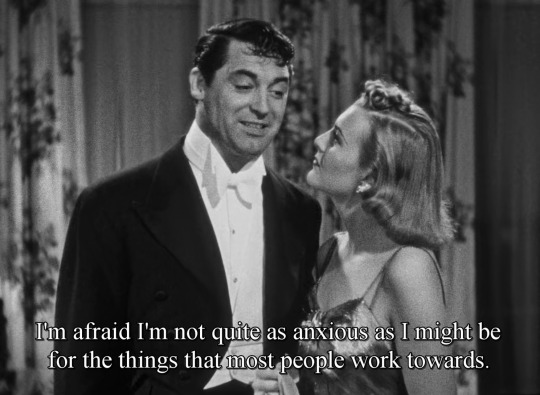
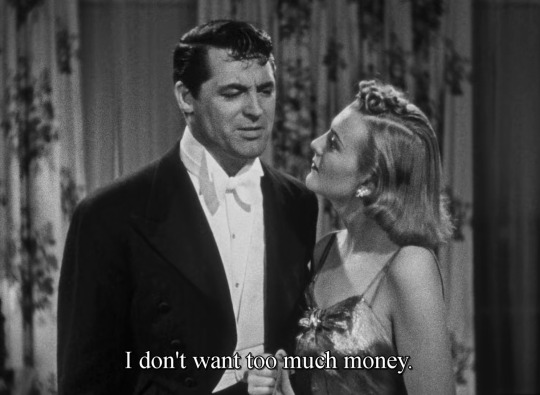
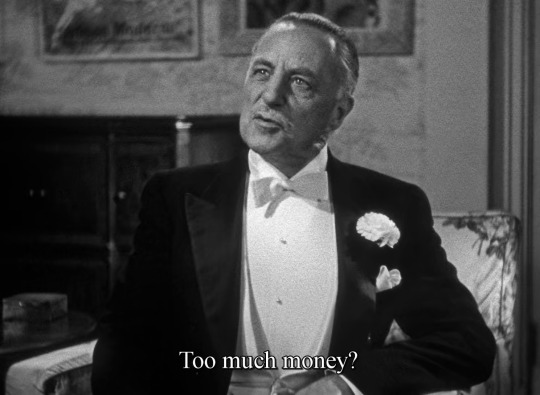
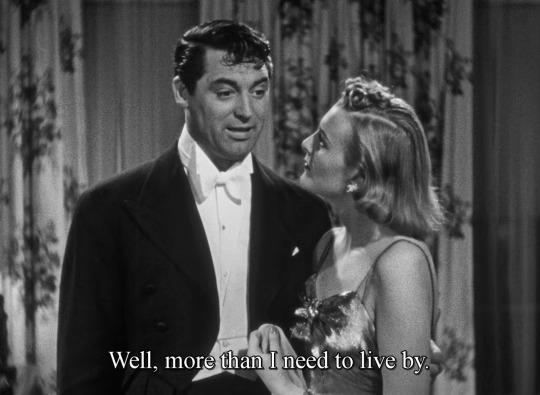
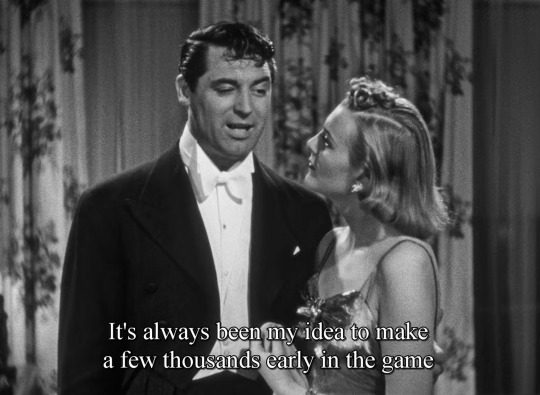

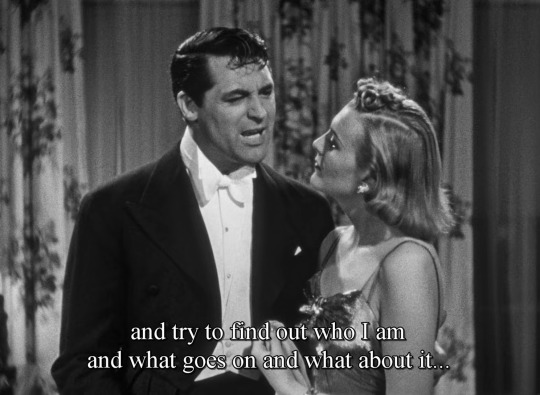
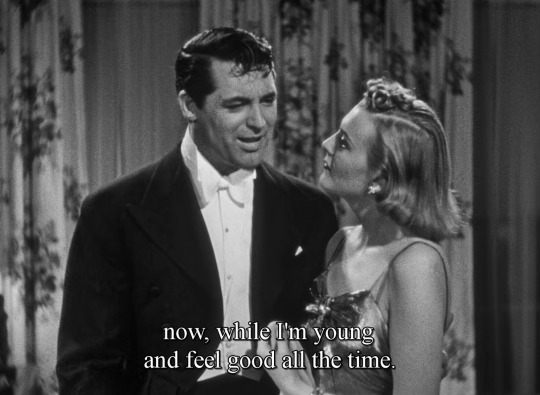
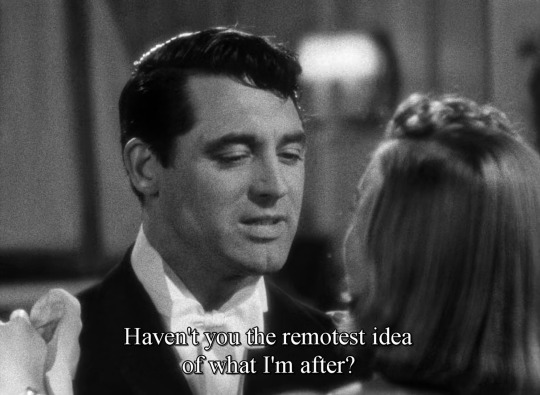
Cary Grant, Doris Nolan, and Henry Kolker in Holiday (George Cukor, 1938) Cast: Katharine Hepburn, Cary Grant, Doris Nolan, Lew Ayres, Edward Everett Horton, Jean Dixon, Henry Kolker, Henry Daniell, Binnie Barnes. Screenplay: Donald Ogden Stewart, Sidney Buchman, based on a play by Philip Barry. Cinematography: Franz Planer. Art direction: Stephen Goosson. Film editing: Al Clark, Otto Meyer. Music: Sidney Cutner. Of the four films Cary Grant and Katharine Hepburn made together, I think George Cukor's Holiday may be my favorite. Their first, Sylvia Scarlett (Cukor, 1935), is just, well, weird. The Philadelphia Story (Cukor, 1940) has maybe a touch too much MGM gloss for my tastes, and James Stewart has a better role than Grant does. Bringing Up Baby (Howard Hawks, 1938) is a greater movie than Holiday and one of the funniest films ever made, but as a showcase for the talents and the chemistry of Grant and Hepburn it falls short because they're mostly called on for one note: zaniness. But Holiday allows them to show off almost everything they could do. It allows Grant to be suave and ardent and acrobatic and sexy. It lets Hepburn be intense and vulnerable and glamorous and noble. As films like his David Copperfield (1935) and The Women (1939) show, Cukor was a master at directing ensembles of colorful players. Here he directs the usually bland Lew Ayres in a heartbreaking performance as Ned Seton, the trapped, alcoholic younger brother of Linda and Julia. He makes Doris Nolan's Julia first a credible match for Grant's Johnny Case and then eases her transition into a chip off the old ice block: the die-hard capitalist tycoon paterfamilias played by Henry Kolker. Johnny's background is illuminated by his friendship with the witty, professorial Potters (Edward Everett Horton and Jean Dixon) as that of the Setons is by the snide, snobbish Crams (Henry Daniell and Binnie Barnes). Of course, all of these relationships are built into the film by its source, a play by Philip Barry adapted by Donald Ogden Stewart and Sidney Buchman, but it's Cukor's skill at keeping them in balance that allows the film to stay away from sentimentality or getting bogged down in satire of the rich. There's a bit of the latter -- and of the leftist views that would later get Stewart blacklisted -- when Seton calls Johnny's desire to take time off from making money "un-American," to which Linda replies, "Well, then, he is, and he won't go to heaven when he dies, because apparently he can't believe that a life devoted to piling up money is all it's cracked up to be." Holiday has a little more satiric bite than the other Barry-Stewart-Cukor-Grant-Hepburn collaboration, The Philadelphia Story, but this is Depression-era political commentary with a light touch. Holiday is one of the greatest members of a much-abused genre, the romantic comedy.
images from 365filmsbyauroranocte
19 notes
·
View notes
Note
I've watch Frasier and Bob's Burger. I love it. You have such a good taste sweetheart.
As you can see i like your taste in series soo can you give a list of your series and films recommendation?
Ah! I'm so glad you enjoy them!
This is so sweet especially because I lowkey think I have absolutely horrendous (and/or just bizarre) taste, so I'm thrilled to hear that you like them, too!
In terms of other series I enjoy: I do not watch a lot of television, but I'm a big fan of Murder, She Wrote, Poirot, and Miss Marple (these are technically ITV series, but they're straight up like mini-movies). I really liked Downton Abbey until, like, season 4 or so. I watch Big Mouth a little, Brooklyn 99 (I have to be in a very specific mood to sit down and watch TV, so it really just depends on that). I grew up watching a lot of British television like The Vicar of Dibley and Are You Being Served?, which I like a lot as well. I grew up watching Friends and I like it as a comfort thing, but I barely 'watch' it, if that makes any sense. I will also...ever so occasionally watch documentaries about ghosts (I don't like ghost hunter things because I believe in ghosts and that feels...rude to the ghosts?) and Old Hollywood.
In terms of film, I'm all over the place. I like slightly creepy stuff and old stuff. My favorite film of all time is The Philadelphia Story, which is a classic farce based on a play and it stars Katharine Hepburn, Jimmy Stewart (who I adore), and Cary Grant. I'm a big fan of Bringing Up Baby (which also stars Katharine Hepburn), Mr. Smith Goes to Washington (another Jimmy Stewart film). I love Alfred Hitchcock movies and my favorite is probably Rear Window. While it isn't a Hitchcock film, I love Charade, Wait Until Dark, and How to Steal a Million (all of which star Audrey Hepburn). I studied theatre and the best movie musicals I've ever seen are Cabaret, The Sound of Music, Meet Me in St. Louis, and Funny Face. I love period romance films, too, like Emma (2020), Sense and Sensibility (the one directed by Ang Lee and written by Emma Thompson because oh my GOD), and the 2005 Pride and Prejudice adaptation. Oh, and An Education.
I'm trying desperately to become like...a film buff? If I had my time again, I'd minor in film studies because I'm a huge fan of it...but I'm not smart enough to, like, talk about it? So, I'll occasionally try and watch, like, a 'smart' movie? In this category of films, there are more critically acclaimed things like When Harry Met Sally or Network or Misery or In the Mood for Love. From this year's Oscar nominees, I loved Nomadland and Promising Young Woman a whole bunch.
However, I also just like what I like and I'm fortunate enough to be getting to an age where I really just watch what I want to watch and don't watch what I don't want to. I'm really easy to please, which is helpful. Growing up, my favorite films were things like Return to Oz, The Cheap Detective, Clue, A League of Their Own, Hocus Pocus, The Addams Family, Who Framed Roger Rabbit?, Corpse Bride (which I still list in my top 5 films of all time), The Secret Garden (1993 one, I think), Little Women, Bedknobs and Broomsticks, and Practical Magic (comfort tip: if you're having a bad day, cut yourself a slice of banana or pumpkin bread, pour a coffee or tea to have with it and watch Practical Magic; it cures the soul).
When I was young, I also listened to director commentaries on movies all the time, still do, sometimes, so I always recommend doing that because it's super fun and interesting. I, like, love knowing why a director wanted a certain actor to stand where they're standing or, like, the symbolism behind a shot. I did this all the time for my favorite Disney films. My favorites are any of them where the art is slightly different or more interesting, so I really love Snow White (frankly, a miracle that film got made), Sleeping Beauty (there was a different animation director than the other original few films and you can really tell), and 101 Dalmatians.
To sum up, I'm a long-winded gal who enjoys old comedies, laughing, slightly spooky things, old-fashioned things and listening to slightly nerdy commentaries. Hope this was...informative? Slightly helpful? Fun?
Love you xx
2 notes
·
View notes
Text
No one asked for this, but I’m sharing my top 7 comfort films because making lists is in itself a comforting activity.
1. I Know Where I’m Going (1945)
This should come as no surprise to anyone who’s ever visited my page. I would gladly give up modern comfort to live on 1940s Mull. The anti-capitalist message plus my end-all-be-all movie star crush mean that I never tire of this film.

2. Pride and Prejudice (2005)
Hear me out before the true Austenites are offended. I try not to think of this as a book adaptation and more as a gorgeous confection to take my mind off the stresses of life. The soundtrack is divine and a good listen on its own and the cinematography is *chef’s kiss.*

3. The Birdcage (1996)
Sometimes one needs to laugh at slapstick and Robin Williams’ brilliant riffing. Are aspects of this film problematic by today’s standards? Sure. But this was a trailblazer in its day and I defy you to find me a more endearing drag queen than Nathan Lane.

4. Julie and Julia (2009)
Okay so technically I just watch the Julia part because Meryl Streep and Stanley Tucci are the cutest. Plus Paris and so much gorgeous food. It’s not Amy Adams’s fault - there’s just little better than Julia towering and wailing over a mountain of chopped onions.

5. The Philadelphia Story (1940)
So hard to choose a George Cukor favorite but this has to be the most comforting for me. Katharine Hepburn is glorious in her impossible parachute pants and her suitors are, well...who’s better than Cary Grant AND Jimmy Stewart?

6. Persuasion (1995)
One of the things I love about this book/movie is the subtleness of Anne and Wentworth’s love story. Neither of them speaks much and that’s why the film works so well for me. I love the natural feel of this adaptation from the salt on the naval uniforms to the rain in Bath.

7. Much Ado About Nothing (1993)
I wish I could say something academic about why I love this film but the truth is that it’s all about Emma. She’s suntanned and divine in this and it makes me forget about Keanu Reeves’s horrible acting entirely. Watching this you get a sense for how much fun they had making the movie. It’s like a brief vacation to Italy.

Thanks for reading. I’m surprised I didn’t go for more black and whites in this list, but I stand by it. Tagging @idlesuperstar and @cinemaocd because they have impeccable taste.
4 notes
·
View notes
Note
recommend me a few lesser-known pre-1965 movies!!
hello anon! i’m gonna recommend mostly happy stuff because it is one in the morning and i think you deserve some happy recs! also these are gonna be in chronological order because my virgo ass wouldn’t have it any other way.
firstly! they’re not lesser-known BUT i would be remiss if i didn’t recommend bringing up baby (1938) and the philadelphia story (1940,) starring my #1 hollywood crushes miss katharine hepburn & cary grant! (these are two of my favorite movies of the era; the philadelphia story is my fourth favorite movie of all time so forgive me if i wax poetic.)
next, my favorite wife (1940.) grant again with randolph scott and irene dunne! (if you like that one, please take a look at this twitter thread of cary grant & randolph scott taking homoerotic photos together. you’re welcome.)
also with grant: arsenic and old lace (1944,) which is just a complete blast. very silly — grant thought his performance was too over the top — but i love it. there’s murder! teddy roosevelt jokes! a dude who tries so hard (seriously, so fucking hard) to be eeevil!
in 1954, mgm released a musical remake of the philadelphia story called high society, because bing crosby really wanted to Sing A Song, i guess! it stars grace kelly, light of my life and h-wood crush #3, in the hepburn role with crosby and frank sinatra as her love interests. not as good as the original but FUN (frank and bing get smashed and sing a song making fun of rich people, if that’s your jam.)
if you like foreign films, i adored cléo from 5 to 7 (1962,) the first agnes varda film i watched. it’s gorgeous and sad but also manages to be very fun!
if you like shakespeare, one of my favorite adaptations is the 1964 bbc telefilm hamlet at elsinore starring christopher plummer as hamlet to michael caine’s horatio! bonus: this one is on youtube :-)
LASTLY, bonus post ‘65 recommendation because i love it so much i recommend it to everyone — bob & carol & ted & alice (1969!) it’s insane in the best way. natalie wood talks her husband and their friend-couple into having a mènage a quartre! there are snappy outfits! it’s very sixties and would never ever ever get made today.
i hope these get you started on a journey with films! if you like them please feel free to come back or recommend films to me ♥️
3 notes
·
View notes
Note
For the ranking ask: Alan Arkin, Gene Kelly, Claude Rains, Katharine Hepburn
ALAN ARKIN
5. Deadhead Miles - There are so many subtle details and touches in Arkin’s characterization that elevate what looks like a drugged up manchild into a rather lonely, sad figure. You get the sense he’s lost anything that anchors him (a family, religion, etc.) and he’s just coasting through life, conning people for kicks more than anything, though he still has a soul and can feel badly for people worse off than himself.
4. The Heart is a Lonely Hunter - Totally heartbreaking performance, yet without an iota of self-pity or bathos. Also, his use of ASL looks very convincing. It makes me sad Arkin didn’t really do more dramatic work of this caliber in the 70s and 80s.
3. The In-Laws - In terms of his pure comedies, this is Arkin’s best that I’ve seen. He plays a straight-laced guy thrown into chaos and his reactions are not mugging, but sheer, void-staring horror and that is hilarious.
2. Catch-22 - Probably Arkin’s technical “best” role or the one that seems most representative of his penchant for the strange, dark comedies where he seems to be most at home. Having read the book first and pictured Yossarian differently, I wondered if he would fit the part. Ultimately, he was perfect at capturing the essence of this classic character.
1. Wait Until Dark - I mean, was there ever any doubt this is my favorite? I can’t resist a bad guy and Roat is one of the best “for the evulz” bad guys ever.
Arkin could have easily just played this character as a boilerplate psycho, but he instead emphasizes the “actor” element of the character, not just in how seriously he takes the roleplaying in the con, but even when he’s being “himself.” He feels like a demon masquerading at being human and the effect is uncanny.
As much as I enjoyed Stacey Keach’s cocaine-fueled scenery-chewing in the 1982 TV adaptation of Wait, it made me appreciate Arkin’s chilling, low-key menace all the more. Like, I love how he never shouts at Susy when trying to intimidate her: he speaks softly, even amiably, which is a sign of his complete confidence-- much more terrifying than a screaming nut TRYING to scare you. In fact, he only shouts when he’s scared, which is just a brilliant choice.
Also, he manages to be quite hot despite having a terrible haircut. A++
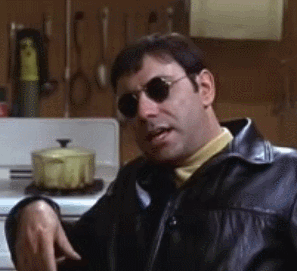
GENE KELLY
5. Brigadoon - So, I’m putting this one here mainly because I don’t remember a lot of it, but I saw this movie at an impressionable age (probably eight or nine) and recall being spellbound by it. Kelly plays a man torn between two worlds-- pretty much literally-- and I recalled being very moved by his romance with Bonnie Jean.
4. The Pirate - So, I’m not crazy about this movie, but Kelly is fun in it from what i recall. Also, he wears tons of ass-hugging, form-fitting 19th-century clothes that make the movie worth every minute.
3. Inherit the Wind - A pure dramatic role where Kelly plays a snarky journalist covering a thinly veiled version of the Monkey Scopes trial in the 1920s. While more of a supporting role, he makes a big impression and I love the way he calls the chimp “GRANDPA!”
2. The Three Musketeers - If Doug Fairbanks never made his version of The Three Musketeers, Kelly would be my favorite D’Artagnan. As it is, he’s second and just as perfect for the role as you would imagine.
1. Singin in the Rain - He’s most remembered for this movie for a reason. He got to be funny, glamorous, and romantic all in one. The “Singin’ in the Rain” number is now so iconic that I think Kelly’s acting gets overlooked a bit in it. He’s just so giddy there-- it’s so sweet and endearing that I can get why A Clockwork Orange recontextualizing that song upsets people lmao.

CLAUDE RAINS
5. The Adventures of Robin Hood - Basil Rathbone is more of the main bad guy in this movie, I guess, but Rains was my favorite of the villains. He’s so fey and deliciously wicked. And Rains really rocks that wig and tunic.
4. The Invisible Man - Only a voice for 99% of the runtime, but damn, he makes an impression.
3. Notorious - A sign of a great actor-- Rains made even a gross ass Nazi likable-- at least at first!
2. The Phantom of the Opera - Rains really made just a great Phantom. He’s not the most lethal or openly menacing, but he is just so tragic and passionate. When he starts reacting very emotionally when he learns his music has been stolen-- oh man. I have not seen the movie in years but that scene plays in my mind with such vividness, especially Rains’ impassioned, enraged line reading.
Rains also benefits from a really nasty-looking makeup. My own skin tingles seeing it. (Take note, Gerard Butler and Julian Sands!)
1. Casablanca - A typical choice? Okay yes. But I just love Captain Renault so much! His witticisms help make Casablanca the classic it is and I love his banter with Rick throughout the movie.

KATHARINE HEPBURN (I am shocked by realizing how little of her bonafide classics I have seen... and with the exception of The Philadelphia Story, I’ve actually only seen these others once and a while ago, so forgive the brevity)
5. Christopher Strong - I don’t really like this movie very much, but Hepburn is fabulous. She makes her strong-willed character so likable that when the “respectable” characters get their happy ending and she doesn’t, you’re just so angry.
4. The African Queen - I recall liking her performance when I saw the film years ago, but aside from her chemistry with Bogie, I can’t go into detail. Sorry.
3. The Lion in the Winter - Her sparring with O’Toole is so entertaining.
2. Suddenly, Last Summer - Among the Tennessee Williams adaptations, this one does not get much press and that’s a shame because Hepburn’s villainous southern aristocrat is chilling to the bone. You just absolutely hate her with relish.
1. The Philadelphia Story - Tracy Lord as a character-- abrasive, arrogant, sneering-- should annoy me. But she’s just so damned likable. Hepburn’s blend of fire and hidden vulnerability make this screwball heroine (or “goddess” if you will) so very appealing. The studio apparently wanted Norma Shearer in the role, but as much as I love her, I think Hepburn was the best choice and she gave a classic performance.

8 notes
·
View notes
Text
Old Hollywood Tag Game💖
I was tagged by the kind & wonderful 🤗@crushondonald (blogger extraordinaire)
Rules: answer the questions below and tag 5 Old Hollywood blogs you would love to get to know better!
1. The movie that made me fall in love with Old Hollywood:

This is a tough one. My Fair Lady was one of my first favs. Arsenic and Old Lace became an annual Halloween favorite. And To Kill a Mockingbird showed me how poignant OH movies could be. Not sure which came first.

2. The OH-actor/actress who could whisk me away on a date any day:
Oh Gene Kelly for sure!!! That gorgeous smile would’ve made me melt into a little puddle if I’d ever seen it in person :)

Then there’s my first OH crush, Cary Grant. Handsome, charming, and such an amazing comedic actor

3. The OH-actor/actress I would be best friends with:
Judy Garland, a wonderful woman who needed more true friends in her life & Katharine Hepburn. I loved her spirit & independence. And the sweet and charming Donald O’Conner

4. The OH-movie I watched more than once:
Umm...besides every Gene Kelly movie in my collection :)

Well...Singin’ in the Rain, An American in Paris, The Philadelphia Story, My Fair Lady, The Wizard of Oz, The African Queen, The Shop Around the Corner...just to name a few
5. The OH-movie line I always quote:
“I’m a good girl I am!”
“Wouldn’t It Be Loverly” - Eliza Doolittle

6. My favourite era:
Probably 40’s to 50’s
I’m tagging:
@ruffalina @clararogers-parker @shoofoogirl @yatanis @fiveoclockangel @kittehexpress @starrynight-over-thepast
No obligation, of course, just for fun!
#thanks for the tag!!!🤗💖😋#not all solely OH blogs but blogs from others who love OH too#I discovered Gene Kelly late but I fell hard when I did :)
12 notes
·
View notes
Photo
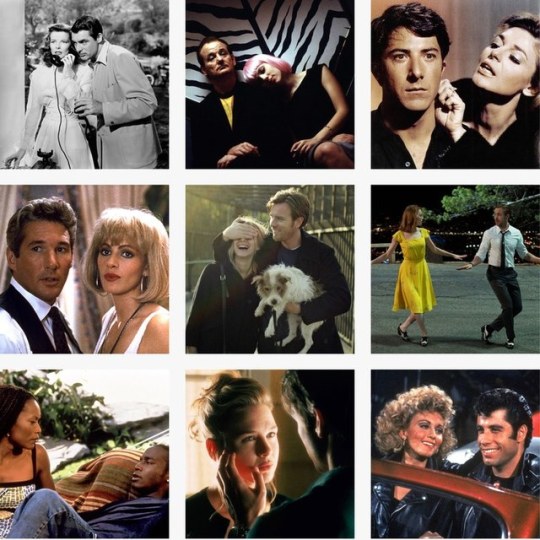
New Post has been published on http://lifehacker.guru/the-55-best-romantic-comedies-of-all-time/
The 55 Best Romantic Comedies of All Time

There is no “best” romantic comedy. Something is funny when someone laughs, or romantic when their heart swells, for better or for worse, and we have no right to say why one of these should top another. Your uncle, or cube-mate might say, “That’s stupid. Breakfast at Tiffany’s is obviously the best rom-com of all time.” And they may not be wrong. But maybe you have some reservations about the horrifyingly racist overtones in some of that movie’s scenes, even though you can’t help loving Audrey Hepburn. Maybe it’s the best for a certain time period. It’s tough. Comedy is subjective. So is romance.
It’s for this reason that we had such a good time making this list, at least initially. And lots of help. People keep a special place in their heart for romantic comedies. They talk about them differently than other movies, and they like to talk about them a lot. When the call went out, we heard from writers, editors, friends, moms, therapists, bartenders, people we hadn’t talked to since high school; the list goes on. The initial gathering of candidates was great fun; the subsequent reaping less so.
First, we had to limit the category. We love Dazed and Confused and it contains plenty of romance, and comedy, but we can’t be sure it’s a romantic comedy per se. Same with Secretary, McCabe & Mrs. Miller, My Girl, Hedwig and the Angry Inch, and about 500 other films. We don’t have enough space here to get into exactly what makes a romantic comedy, but let’s agree that the fact it is not a tragedy or a history is not enough. Somewhere we have to draw the line between the actual rom-coms and the coming of age movies, or mysteries, or adventures.
It’s for this reason we need to apologize in advance: A number of your favorite romantic comedies will not be on this list. Some of them didn’t fit the mold. Others—and this part got a little heated—we just couldn’t get on board with. Decisions had to be made. Hopefully, as a benefit to any disappointment of missing favorites, you’ll find some new ones you didn’t yet know you liked. After all, that’s the message from Pretty Woman, right? It’s important to keep an open mind. Otherwise, you could be making a big mistake, big, huge.
These are the best 55 rom-coms for every situation. We hope you love them.
The Best Rom-Com . . .
. . . to put your one-night stand in perspective:
Obvious Child (2014)
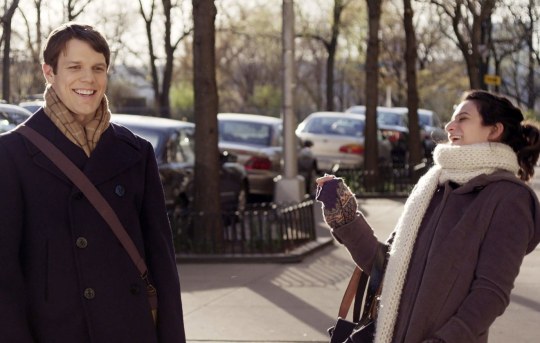
Photo: Everett Collection
The hardest you’ll ever laugh about abortion. That’s right, abortion. Talk about playing with fire, but this tender, deeply human comedy from director Gillian Robespierre finds entirely new ways into the story of losing Mr. Wrong, then Finding Mr. Right (by having our hero, a struggling comedian—played by the irrepressibly honest and infinitely endearing Jenny Slate—get drunk with Mr. Right, sleep with Mr. Right, get pregnant by Mr. Right, and then deal with the consequences). While riotously funny, Obvious Child set a new standard for intimacy, and Robespierre’s ribbed, tone-perfect writing and Slate’s raw but intelligent performance managed to shape a millennial mirror more reflective than anything Girls could put forward in six seasons. And give us the abortion comedy we didn’t know we needed.
. . . to deal with your workplace crush(es):
Broadcast News (1987)
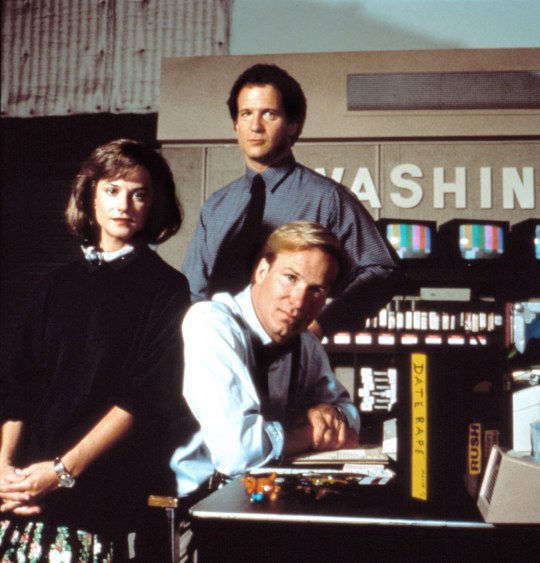
Photo: Everett Collection
In the mid to late ’80s, there was nothing bigger than TV news and James L. Brooks, and Broadcast News was their meeting ground. After the slaphappy, very silly, and very male comedies of the late ’70s and early ’80s (think Animal House, Porky’s, and Revenge of the Nerds), and alongside the epic big-budget projects like Ghostbusters and the original Indiana Jones, James L. Brooks continued to redefine what rom-coms could be with this sprawling, occasionally dramatic but never self-serious, workplace comedy. We root for Albert Brooks’s Aaron Altman, the brainy, nervous, serious journalist who competes for the affections of neurotic producer Jane Craig (Holly Hunter) against the impossibly polished (and intellectually inferior) Tom Grunick (William Hurt). Brooks is the producer behind films like Bottle Rocket, Say Anything . . ., and Big, and TV series like Mary Tyler Moore, Taxi, and The Simpsons. No one knows how to get at our hearts—thoughtfully, gracefully, and with humor—like James L. Brooks. And this is him at his peak.
. . . to see past a gruff exterior:
Beauty and the Beast (1991)

©Buena Vista Pictures/Courtesy Everett Collection
“Tale as old as time . . .” It really is. Lonely, powerful dudes have been making off with damsels and then hiding them away since at least Greek mythology and probably before. Where Disney scored with its animated musical was in—pardon the pun—reanimating that classic story line in a way that was appealing to our eyes and ears, and that of our kids’, while maintaining some real danger in the narrative. It’s a triumph they repeated with Aladdin and The Lion King, but is especially notable with a romance—making the stakes high enough—and real, even when accompanied by singing teapot—that we root for these characters to end up together.
..for when you’re in the mood for first love, Wes Anderson-style.
Moonrise Kingdom (2012)
“I will meet you in the meadow,” writes bespectacled Sam (Jared Gilman) to serious Suzy (Kara Heyward) as they prepare to run away together. Wes Anderson’s Moonrise Kingdom, a whimsical tale of a romance betwixt a pair of wise-beyond-their-years 12-year-olds (beautifully art-directed and accessorized as always), is a tonic to the jaded palate. The children, with their barely sexual, pure-hearted affection for each other, could teach the misbehaving adults around them a thing or two about love. Who wouldn’t want to dance on the beach in their underwear to Françoise Hardy?
. . . to get you over getting over your ex:
The Philadelphia Story (1940)

Courtesy Everett Collection
The credits of The Philadelphia Story read like something out of a dream: Cary Grant and Jimmy Stewart vying for the love of Katharine Hepburn. It’s produced by Joseph L. Mankiewicz (writer of All About Eve and Cleopatra), and directed by George Cukor (who made 1954’s A Star Is Born, Justine, and My Fair Lady, and once told Marilyn Monroe, “That will be just fine, darling” when, about to film a skinny-dipping scene for Something’s Got To Give, she expressed her concern that she only knew how to dog-paddle). The Philadelphia Story relies on some dependable tropes—lovers who’ve fallen out; will-they-or-won’t-they-get-back-together—that have provided romantic tension from A Midsummer Night’s Dream to Crazy, Stupid, Love. But it’s Hepburn, aiming for a comeback following some serious bombs, and her witty repartee with her two love interests, Grant (her yacht-designing reformed bad boy of an ex-husband) and Stewart (a tabloid reporter), that is the movie’s bread and butter. The Main Line has never been so well represented.
. . . to take on a trip:
Lost in Translation (2003)
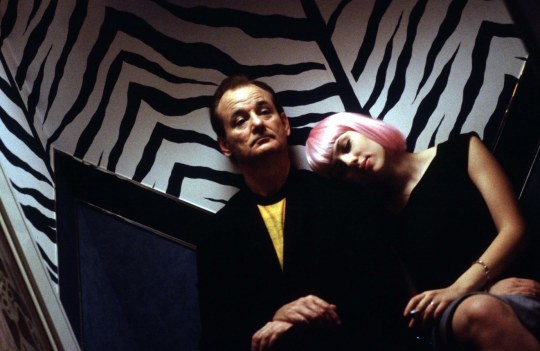
©Focus Films/Courtesy Everett Collection
There was never any doubt that Scarlett Johansson was going to be a mega star, but Sofia Coppola’s movie—about the lonely wife of a photographer who befriends an over-the-hill movie star (Bill Murray) while visiting Tokyo—is what made the world stand up and realize we were dealing with a serious actor. Like many of the films on this list, Lost in Translation takes place in a bourgeois universe, where the greatest thing at risk is someone’s heart, or future emotional happiness, but few films have so effectively crystalized the alienation of both travel and marriage, as well as the difficulties of postcollegiate, and then midlife, malaise. The older man and the younger woman don’t so much meet-cute as crash into each other, picking up each other’s pieces, redeeming each other’s lives as they navigate their surreal setting. It’s a match made in heaven—and without spoiling anything, their goodbye scene is among the best in Hollywood history.
. . . to reevaluate your checklist:
Clueless (1995)

©Paramount/Courtesy Everett Collection
The motherless daughter, caring for her father and looking for her prince, is a trope that goes back to the fairy tales, but how Alicia Silverstone (who plays our hero, Cher) and writer-director Amy Heckerling contemporized that narrative is what made what could have been a silly teen flick into an instant classic. They imported a Jane Austen story line of a meddling would-be matchmaker (Emma) into a bright pink, plastic, kids-are-adults world of Beverly Hills privilege populated by overly dramatic in-talk (“Whatever!”; “As if!”), lunatic high fashion, and decidedly un-relatable problems. At the same time, they maintained a storybook sensibility, and somehow kept our sympathies with the lovelorn Cher, whose insipidness is overshadowed by her charity, loyalty, and genuine goodwill. We believe she deserves love, and if she gets smart enough to stop looking for it in the “right” places, we want her to find it.
. . . to help you sort out what to do with the rest of your life:
The Graduate (1967)
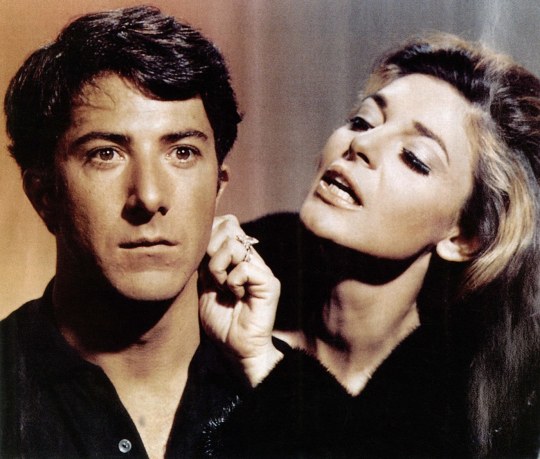
Courtesy Everett Collection
This is the film on this list that is least certainly a rom-com; it caused a bit of a row, in fact. Some of us believe that this movie is ultimately too sad to give the viewer the warm fuzzies they depend on this genre for. Others argue that this line of thinking may confuse what’s depressing with what’s complicated. The story of the listless Benjamin Braddock, recent graduate of Williams College, who begins an affair with his father’s partner’s wife, and ends up falling for her daughter, did more to advance the critical value of comedy than perhaps any other film. (Not to mention the sexual viability of Williams grads.) There may be no more iconic line than Dustin Hoffman’s “Mrs. Robinson, you’re trying to seduce” but this movie is so much more than dialogue. (Note: Hoffman might have been playing 21 when he said this line, but the actor was 29; Anne Bancroft, the supposedly senior Mrs. Robinson, was all of 35.) Oft-quoted, ripped off, referenced, and discussed, Mike Nichols’s 1967 romp through Braddock’s postcollegiate uncertainties was released a few months after the Summer of Love, as the counterculture had peaked and what Hunter S. Thompson called the “high and beautiful wave” was getting ready to roll back. Young America was, and to some extent still is, Benjamin Braddock, which reveals the power of this film.
. . . to ask for assistance in the ol’ love department:
Sleepless in Seattle (1993)

©TriStar Pictures/Courtesy Everett Collection
Tom Hanks had been responsible for some ’80s hits—Splash and Big—but with Nora Ephron’s 1993 film about a widower whose son calls in to a radio show in an attempt to find him a new wife, he cemented himself as America’s favorite, well, person. Meg Ryan, his competition for that title (at least in the ’90s), plays an unhappily engaged Baltimore Sun reporter who writes Hanks’s character on a whim, asking him to meet her at the top of the Empire State Building (cue: An Affair to Remember) on Valentine’s Day. Utterly contrived, but utterly charming, this quick, silly, funny film is pabulum superfood for anyone who believes in second chances and true love.
. . . to leave the past behind you:
Breakfast at Tiffany’s (1961)

Courtesy Everett Collection
No one has stolen more hearts than Holly Golightly (Audrey Hepburn). Based on Truman Capote’s 1958 (harsher) novella of the same name, Breakfast at Tiffany’s—the story of a friendship struck between a rarely employed writer, Paul Varjak, and his neighbor, the naïvely beautiful Golightly, a freewheeling party girl whose lifestyle is paid for by the rich suitors who surround her—is a building block of our Hollywood romantic fantasies. It has the unclassifiable, magnetic object of affection, the reliable underdog who pursues her, expectations dashed, new friendships formed, true selves discovered, and an undeniably racist portrayal of an Asian landlord (by Mickey Rooney). Yes, it was a different era, but this detail can be difficult to ignore. That said, there are generations of viewers who consider this the greatest rom-com of all time.
. . . to get past that one little (or gigantic) flaw:
Moonstruck (1987)

©MGM/Courtesy Everett Collection
Cher plays a widowed bookkeeper in Brooklyn Heights confronting her parents’ infidelity (and fallibility) who—whoops!—falls for her fiancé’s younger brother (Nicolas Cage), who sports a prosthetic wooden hand after an accident with a bread slicer. Their first night together produces one of the great moments in the annals of rom-coms: When Cage tells Cher he loves her, she slaps him, saying “Snap out of it!” The film portrays a New York that doesn’t really exist anymore—for one thing, Brooklyn Heights is full of bankers now. It’s a window to another time, when marriage meant something different in male-dominated second-generation immigrant families and the challenges Cher’s character places against the social order are both important and revelatory (she won an Oscar for her efforts). You end up cheering not just for her romance, but also for an entire insurgency.
. . . to put the fuckboys behind you:
Bridget Jones’s Diary (2001)
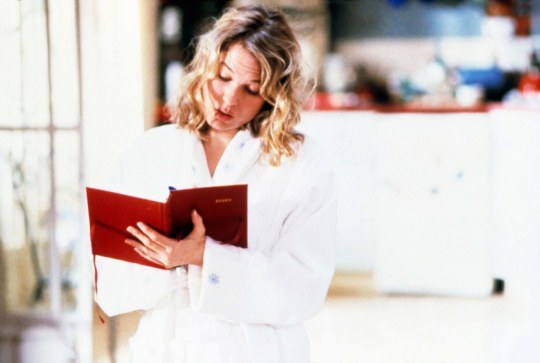
Courtesy Everett Collection
Hollywood does this silly, shitty thing when they want to make it clear that a woman is “funny”: They make her clumsy. “Did you see that? She fell down in front of the boss she has a crush on while carrying many things! What a wit!” Thankfully, this film is actually funny, and so is Renée Zellweger, the titular Bridget Jones, who is 32 and a bit clumsy, and believes herself to be both a tad overweight and running short of romantic options. She confesses to her diary her feelings about the men in her life: her caddish colleague, Daniel (Hugh Grant), and her pill of a childhood friend, Mark Darcy (if that surname sounds familiar from one of your favorite literary comedies, that’s not by coincidence), who begin vying for her hesitant affections in their respectively charmless ways. Who will win—the nice guy or the jerk? The clumsy, funny, openhearted girl, of course! The story has a classic but important lesson to share: First impressions aren’t everything (and a fashion-related takeaway—never judge a man by his Christmas sweater).
. . . to make you even more neurotic about your love life:
Annie Hall (1977)
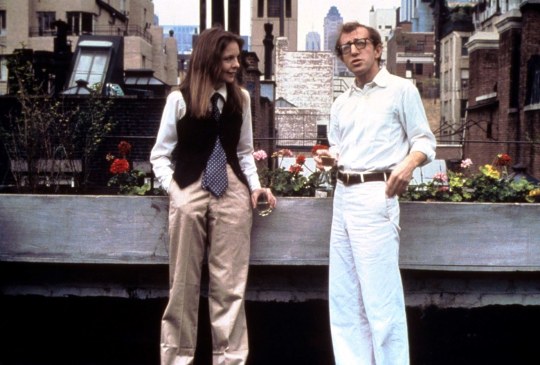
Courtesy Everett Collection
Like Breakfast at Tiffany’s, this is one of those movies that any list of top rom-coms would be remiss without. Yes, Alvy Singer’s (Woody Allen) story about how he met, and then lost, and then maybe regained, the love of his life, Annie Hall (Diane Keaton), is a wonderfully funny underdog-meets-girl story. But Allen’s uniquely observational humor also introduced some pioneering tropes and storytelling devices to the annals of rom-coms. The moment his grade school classmates stand up and give short peaks into their future (“I used to be a heroin addict; now I’m a methadone addict”). Or when Alvy interrupts a pedantic professor in a movie line—lecturing his date on Marshall McLuhan—by bringing the actual Marshall McLuhan out from behind a sign to set the man straight. These established entirely new directions for comedy. Moreover, Allen’s confessional style and the monologue with which he begins telling his warts-and-all fictional tale established a new paradigm for romantic storytelling, one that continues to influence rom-coms today (same for Diane Keaton’s outfits, but that’s a topic for another list).
. . . to get you pumped up:
Bring It On (2000)
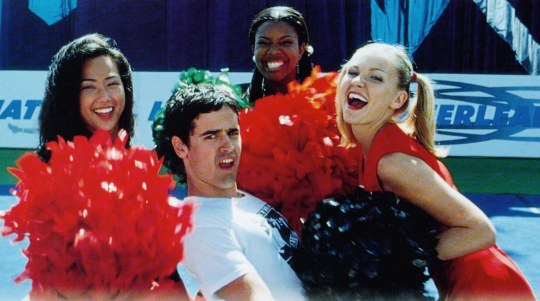
©Universal/Courtesy Everett Collection
This is the pregame of romantic comedies. It’s a love story—between millennial hotties Kirsten Dunst and Jesse Bradford—packed into 98 minutes of jokes, rivalries, teen romance, and ridiculous cheers. (“Hate us ’cause we’re beautiful—well, we don’t like you either. We’re cheerleaders. We. Are. Cheerleaders!”) Some of us have defended this movie since it bowed (and then cartwheeled into an aerial walkover) in 2000 as a sharp appreciation of teen culture and teen cinema, both devoid of cynicism and long on wordplay. If you agree, welcome to the squad. If not, please keep in mind, “This is not a democracy; it’s a cheer-ocracy.”
. . . to take an break from yourself:
Roman Holiday (1953)

Courtesy Everett Collection
There’s a wonderful moment in Roman Holiday—the story of a European princess, played by Audrey Hepburn, who tires of her duties and runs away from her handlers while visiting Rome—when Joe (Gregory Peck), a reporter showing her the city, puts his arm in the Mouth of Truth (a statue that supposedly bites off the hand of liars) and removes it with his hand missing. The princess screams—Hepburn was apparently not acting here—and then recovers. It’s a metaphoric yawp for all that a romantic comedy should be. It’s being taken by surprise, taken by a stranger, the discovery a new side of oneself while falling for someone else. And that’s just one moment!
. . . to get him into rom-coms:
The Princess Bride (1987)
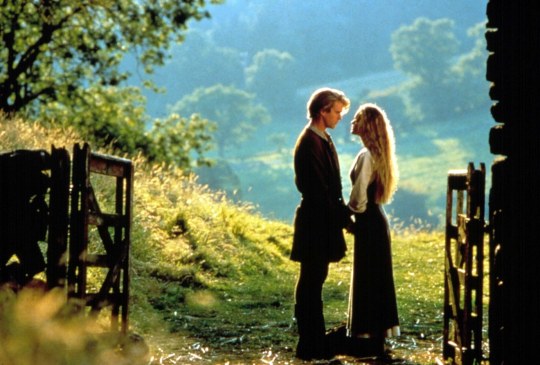
©20thCentFox/Courtesy Everett Collection
“Is this a kissing book?” Fred Savage’s little boy asks his grandfather, at his bedside to read him The Princess Bride when he’s home sick from school. Sure is, but it’s also a tale of swashbuckling, cruel kings, giants, swordsmen, poison, monsters, rebels, and knights—without a dull or unfunny moment. The kid, and the viewer, is quickly on board. More than anything, it’s a tale of true love, and fantastic as it might be, the adventure that leads the stable boy, Westley, back to his mistress, Buttercup (played by an impossibly beautiful Robin Wright), has left few hearts unmoved, and few faces without with smiles.
. . . to consider what you could have done differently:
Groundhog Day (1993)
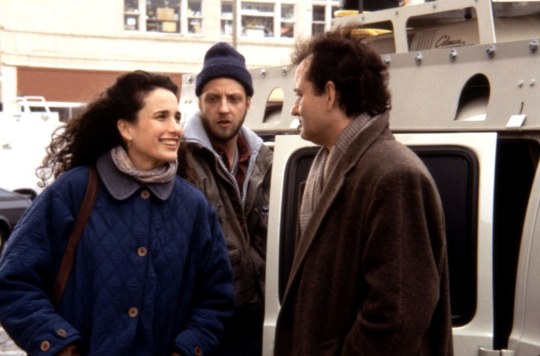
©Columbia Pictures/Courtesy Everett Collection
One of the few rom-coms that comes with both a stamp of approval from your philosophy professor and the Tony reaches of Broadway. A cynical Pittsburgh weatherman (Bill Murray) is sent to Punxsutawney, Pennsylvania, with his producer, Rita (Andie MacDowell) on a dead-end assignment: to cover Groundhog Day. And boy, is it a dead end. Murray gets stuck there, not just in a snowstorm, mind you, but in a continuous loop where no matter what he does—including suicide—he wakes up in the same hotel, on the same day. At first, the weatherman is predictably bummed, but eventually he uses all the information he’s picked up living the same day over and over to better himself and the lives of those around him, eventually impressing Rita with his change of personality. Watching Bill Murray is fun, watching Bill Murray struggle is really fun, and watching Bill Murray caught in a space-time logjam, wrestling with moral philosophy while pursuing Andie MacDowell is the most fun.
. . . to find “our song”:
Nick and Norah’s Infinite Playlist (2008)
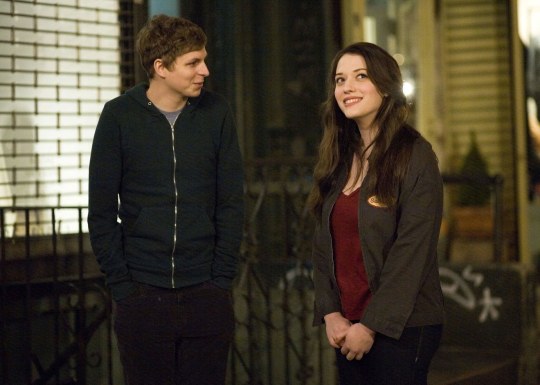
Entertainment Pictures / Alamy Stock Photo
There’s something almost quaint about Norah’s search for her orgasm. The high schooler, played by Kat Dennings, is demeaned by her fellow classmates for having yet to experience the big O. It may sound tawdry, yet this plot point harkens back to a sweeter, John Hughes–era teen comedy (with a few switches flipped) wherein the search for a simple sex act was enough motivation for a number of scenes, if not an entire film. Norah’s lack of fulfillment isn’t what moves the action here; instead we’re on a search for her best friend and an oh-so-cool band’s secret show, with Nick’s (Michael Cera) hapless band, in his hapless car (a Yugo), through downtown New York City’s music scene. It’s a good-time flick, with cheerful performances and the kind of supporting cast (Ari Graynor as the beyond-drunk best friend) that make 90 minutes seem like a brisk 30. One of these is Alexis Dziena, who plays Nick’s very recent ex-girlfriend: She toyed with him and never appreciated the music mixes he made for her (spoiler: Norah loves them). Her “sexy” dance, in the glaring light of Nick’s high beams, to Hot Chocolate’s “You Sexy Thing” is one of the great falls from grace, and worth the price of admission.
. . . to inspire some big changes:
Pretty Woman (1990)

©Buena Vista Pictures/Courtesy Everett Collection
Is there a rom-com list that doesn’t include this movie? What’s left to say about the 1990 tale of the beautiful, charming prostitute and the Wall Street corporate raider who meet and fall in love? Here’s director Garry Marshall’s (and Julia Roberts and Richard Gere’s) genius with this film: They make us forget about the various horrors of sex work and instead convince us the whole thing is kind of a lark. This film takes place in the late 1980s; a high-water mark in terms of the HIV crisis. Those things aren’t on our minds when we watch this movie (barring an early scene discussing methods of birth control); we think about stomping divots and Richard Gere conquering his fear of heights. So what? The Great Escape doesn’t exactly feature the horrors of World War II. That’s not the story they’re telling. Exactly our point. That’s how delightful this movie is.
. . . to make your arguments a little sweeter:
Bringing Up Baby (1938)

Courtesy Everett Collection
Here’s how cute rom-coms were in the 1930s: The entire plot rests on a dog burying a bone of a brontosaurus. Katharine Hepburn, whom the movie was written for, plays a whimsical, adorable socialite who has become besotted with an otherwise engaged (literally and figuratively) paleontologist, played by Cary Grant, and is trying to keep him around so he won’t go marry some pill. Her strategy for doing this is to invite him to her house so that he can help her bring a baby leopard to the city. (Later, the dog and the leopard wrestle.) This is what we call a screwball comedy. It’s also priceless, with Hepburn peppering Grant in her sweet, Gatling gun style, and Grant, playing stiff, as if any man, never mind a mild-mannered paleontologist, could ever resist such wiles.
. . . to make it a girls night:
10 Things I Hate About You (1999)
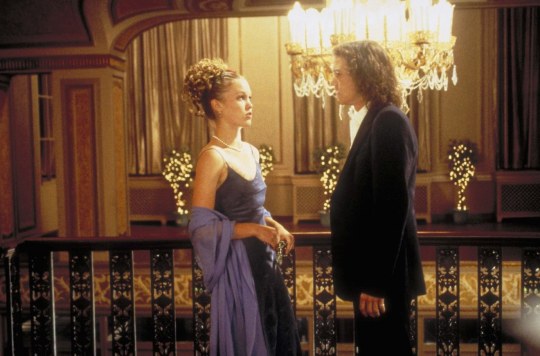
©Buena Vista Pictures/Courtesy Everett Collection
Why is there no actual Shakespeare on this list? Because often a three-hour production: (1) is rarely funny, and (2) doesn’t really fit into a modern romantic comedy structure. Instead, we have movies that are actually fun to watch, like Shakespeare in Love, and this one, a teen-ready take on The Taming of the Shrew. There are some cute turns from youngsters Joseph Gordon-Levitt, Julia Stiles, and Larisa Oleynik, but ask most women and the performance that sticks out is Heath Ledger’s, whose thuggish Patrick Verona made many of us weak in the knees. Like Bring It On, and unlike most films, especially teen films, this one is female focused. They’re the moral centers. The heroes we cheer for. And they are active in as much as the narrative as they are subject to it (rare!).
. . . to better understand your parents:
Beginners (2011)

©Focus Features/Courtesy Everett Collection
“The History of Sadness” is a sketchbook drawn by Ewan McGregor’s Oliver, a graphic designer who is dealing with the recent coming out of his septuagenarian father, Hal (Christopher Plummer—who won an Oscar for his performance). Hal’s new openness about his own life inspires Oliver to reevaluate his own sadness and pursue a lovely French actress, Anna. It’s an incredibly touching, difficult story, told mostly in flashback, that involves Oliver coming to grips with his father’s past, his parents’ relationship, his own choices, and his art. But it’s ultimately a love story. A story about how our parents love us, and each other—despite the difficulties imposed society, time, and work—and how in turn, we learn to love, or not. We’re all beginners, in all our loves, and to think otherwise is foolhardy.
. . . to freeze some already cold feet:
The Wedding Singer (1998)

©New Line Cinema/Courtesy Everett Collection
Millennials might not realize from Adam Sandler’s recent descent into perennial schlock (some of it racist and sexist)—like The Ridiculous 6, Blended, Jack and Jill, and Grown Ups—that his movies were, at one point, very funny. Billy Madisonand Happy Gilmore are ’90s classics, and The Wedding Singer, his only rom-com from that era (there’s some debate over whether P. T. Anderson’s Punch-Drunk Love, released in 2002, qualifies as such), is a hilarious, touching ode to traditional values. Set in the ’80s, Sandler’s Robbie Hart is a wedding singer (and hopeless romantic) recently left at the altar who helps Drew Barrymore’s Julia plan her wedding to the wrong man. Sandler and Barrymore’s chemistry is off the charts, and this film—not Mad Love, sorry—established the actress as rom-com gold (see Never Been Kissed, 50 First Dates, and Fever Pitch). The romance is great, the jokes are great, the costumes are great, and not to ruin anything, but Billy Idol is pretty great too.
. . . to get you singing and dancing (and maybe moving to L.A.):
La La Land (2016)

©Lions Gate/Courtesy Everett Collection
The highway scene. Ryan Gosling hunkered over the piano. Emma Stone embodying “irrepressible.” His dance on the boardwalk. Her spins. The way she pulls at her dress. The way he grins while he smolders. Their love. It’s a panacea for the reasons we go to the movies. At no point do we believe they won’t end up together, but we stay transfixed, in fact we tap along. For younger viewers—those of us who might not have drank down the moving magic of Singin’ in the Rain, West Side Story, or Gigi—Damien Chazelle’s La La Land forgives those lapses. It embraces their greatness as it embraces us in its giant, vibrant arms. We lean closer to the screen, not to learn but to feel for the whole experience of youth and performance: all that hope, drive, sweat, and love. Can’t forget love.
. . . to kick-start your career goals:
Singin’ in the Rain (1952)
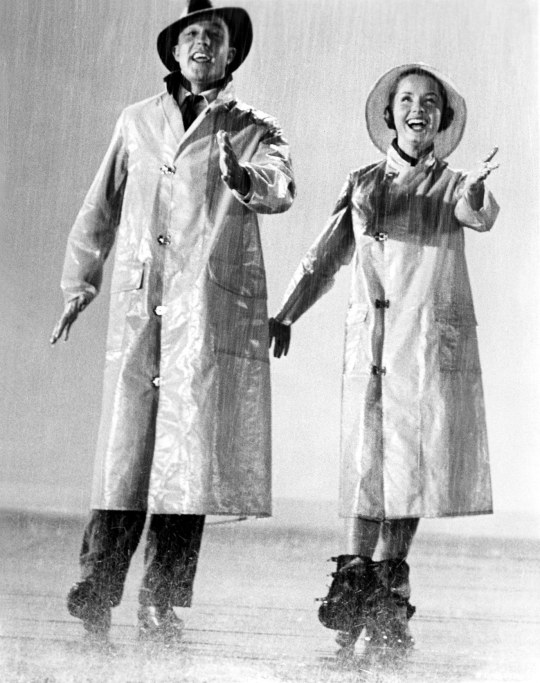
Courtesy Everett Collection
Here’s the thing: You’re not really allowed to like La La Land if you don’t like Singin’ in the Rain. Or, you at least have to watch it; it’s the original musical about making it in Hollywood. The story of a sellout leading man (Gene Kelly) who falls for the chorus girl (Debbie Reynolds) who might just change his life (and he hers), this 1950s romp through 1920s Hollywood really has it all: singing, dancing, and bedrock songs like “Make ’Em Laugh,” “Good Morning,” and of course, “Singin’ in the Rain.” It’s cute as hell and tap-happy to the extreme.
. . . to unplug from the office (and get your due):
How Stella Got Her Groove Back (1998)
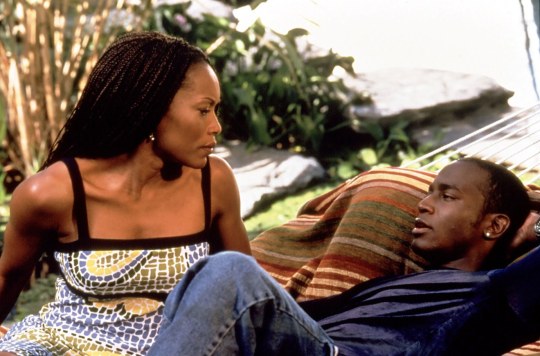
©20thCentFox/Courtesy Everett Collection
The movie that inspired 90 percent of vacation hookup jokes since 1998 (but seriously, we need to talk about Taye Diggs in a puka shell necklace; the man can make anything look good). Workaholic executive and single mom Stella (Angela Bassett) finds more than she bargains for when her best friend, played by Whoopi Goldberg, convinces her to take a much-deserved Caribbean vacation. Cheeky, subversive, and sexy as hell, this movie turned the tables on so many male-dominated rom-coms (courtesy of one very hot and heavy matchup between Bassett and Diggs, playing some 20 years her junior)—and passes the Bechdel test with flying colors. One of the very few rom-coms to do so.
. . . to get dressed up for:
Tootsie (1982)
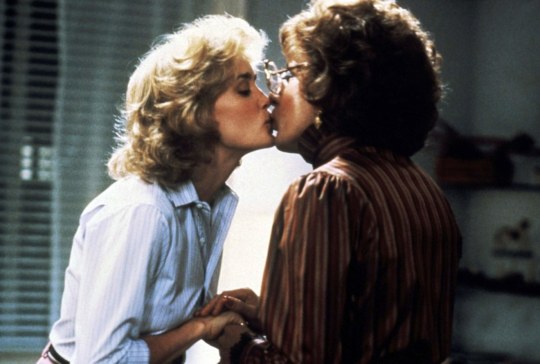
©Columbia Pictures/Courtesy Everett Collection
Michael Dorsey (Dustin Hoffman) is a New York actor who is such a perfectionist, no one wants to work with him. So he does what any rational man would do: He dresses as an entirely different person—an older woman who goes by then name of Tootsie—and lands a role on a soap opera where he becomes a sensation. Problems arise when he falls in love with his costar (Jessica Lange) and a fellow castmate, an older man, falls in love with him. It’s madcap and zany but also profoundly funny, with insights aplenty—it sends up television, sexism, and New York society—and performances that were Oscar-worthy (Lange’s in particular—of Tootsie’s 10 Oscar nominations, she’s the only one who walked away with a statue).
. . . to reevaluate the nice guy (and the bad boy):
Something Wild (1986)

©Orion Pictures Corp/Courtesy Everett Collection
Before Johnathan Demme decided to win an Oscar and scare the pants off an entire generation with The Silence of the Lambs, he was an ’80s funnyman. And this is his best work. It’s the story of a mild-mannered exec (played by Jeff Daniels), whose sedentary life is turned upside down by the wildly adventurous, somewhat grifting Lulu (Melanie Griffith)—whose checkered past includes a roustabout, criminal ex-boyfriend played by Ray Liotta. The idea of a “crazy” girl coming in and turning a straight man’s existence topsy-turvy is repeated countless times in this genre, from Bringing Up Baby to The Girl Next Door. Demme’s alchemy here is to infuse the trope with unpredictability. The comedy keeps us on the edge of our seats by compounding the will-they-won’t-they question with sudden breaks into violence, threats, or chase. Rom-coms don’t get more exciting than this.
. . . to escape it all:
Midnight in Paris (2011)
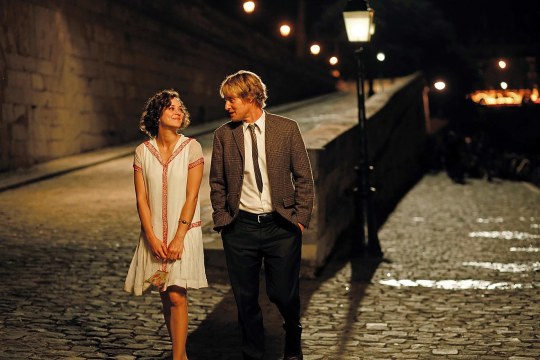
Sony Pictures Classics/courtesy Everett Collection
The love story here is as much between writer-flaneur Gil Pender and Paris as it is between Gil and any of the women in this film. While visiting the French capital with his uptight fiancée, Inez (a sublime Rachel McAdams), and her parents, each night Gil goes walking and finds himself in the City of Light of the 1920s, complete with Hemingway, Gertrude Stein, the Fitzgeralds, Man Ray, Josephine Baker, Cole Porter . . . and a beautiful woman named Adriana (Marion Cotillard). It’s a writer’s fantasy made real (Stein volunteers to read his novel), but it’s also Woody Allen at his most effective: taking the vicissitudes of relationships and turning them into a mirthful, if neurotic, journey. This one just happens to also navigate through another time and place as well. And a beautiful one, at that. There’s a reason this is Allen’s highest-grossing film of all time.
. . . to escape the friend zone:
When Harry Met Sally. . . (1989)
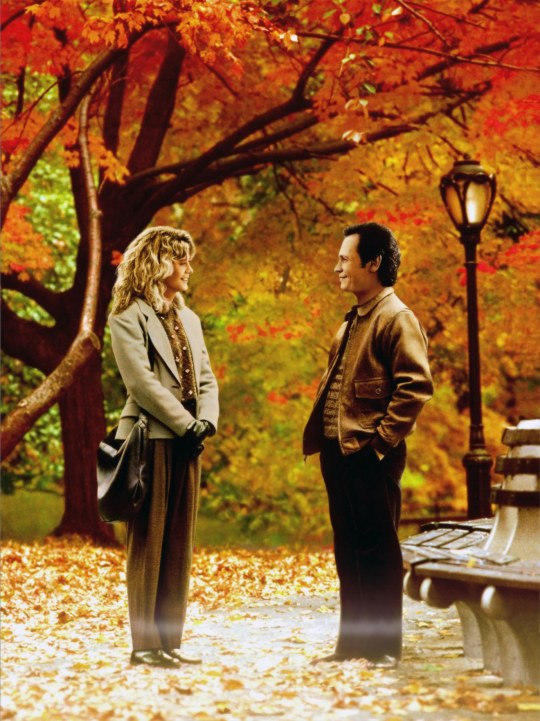
©Columbia Pictures/Courtesy Everett Collection
If this list were a top 20 instead, this film would still be on it. Same with top 10—and five. It’s in the running for the best rom-com of all time because it is sassy, sultry, snappy, cinematic perfection, thanks to words from Nora Ephron and direction from Rob Reiner. It’s something of an epic of the genre, spanning over 10 years of the kind of friendship (between Meg Ryan and Billy Crystal’s characters) where no one can help but ask, “Why aren’t those two together?” Should friends ever sleep together? If they do, what happens next? This movie should be watched by every college student on the planet. Bonus: Watch this movie with a boyfriend, and pay attention to what happens to his face during Meg Ryan’s most famous scene, in which she illustrates just how easy it is for a woman to fake an orgasm.
. . . to unite with your crew:
Bridesmaids (2011)
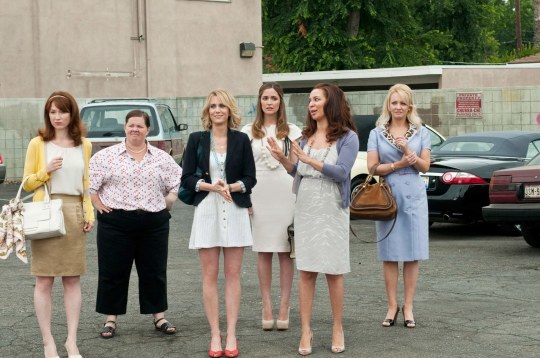
©Universal/Courtesy Everett Collection
Who ever thought getting food poisoning in a wedding dress could be so funny? Bridesmaids is as much a buddy comedy (think Old School or Twins) as it is a rom-com, proving that female actors can be just as bawdy and into gross-out humor as their male counterparts in The Hangover. This is about the love between friends, yes, and the agony that comes with maturing at different paces, but what ultimately drives the film is the desire of Annie (Kristen Wiig, who also wrote the script, with Annie Mumolo) to catch up. This movie isn’t as much about what we have as about what we’re missing, and how a wedding can bring that to the fore. Along with nonstop laughs, we get a powerhouse performance from Wiig—even as Melissa McCarthy steals the show.
. . . to remind you that guys will try anything:
There’s Something About Mary (1998)

©20thCentFox/Courtesy Everett Collection
Before we had a president who bragged openly about grabbing women “by the pussy”, this is what qualified as a gross-out film. Amid scenes of semen being used as hair gel and testicles jammed in zippers, the Farrelly Brothers managed to concoct an amiable story about a nerdy Ted (Ben Stiller) hiring a private detective to find Mary (Cameron Diaz), the object of his unrequited love in high school. Despite the over-the-top locker-room gags, the movie has virtually no sex, and manages to emerge as hilarious, sweet, and satisfying.
. . . to make up your mind, dammit:
Manhattan (1979)

©United Artists/Courtesy Everett Collection
Elephant in the room: Yes, this is Woody Allen pursuing a high school student (a luminous Mariel Hemingway). It was also made in 1979, and that didn’t carry quite the same connotations as it does now. The year is important, because as the film’s title suggests, this movie is as much about New York as it is about the lovers who collide inside of it (Allen’s character, Isaac, begins the film dating the high schooler, but leaves her for his friend’s mistress, played by Diane Keaton). In the mid-to-late 1970s, New York was a bit of a cesspool: Crime was out of control, repeated requests for federal aid were denied, and the city was on the edge of bankruptcy. It’s in the wake of this tumult that Allen pens his black-and-white love note to his fair city. The film opens with a montage of New York’s skyline and street scenes, revealed to “Rhapsody in Blue,” and Allen’s voice-over as Isaac, writing about his romantic love for the city. That’s where he gets us with this film; Allen crystalizes the outsize feelings that can swell with romance, despite any and all evidence that should temper them. It’s a movie about indecision, bad choices, and falling for the wrong people, but it celebrates the impetus for all of these. We love the things we shouldn’t. That’s life. That’s Manhattan.
. . . to know if he’s worth the trouble:
Say Anything. . . (1989)

Photo: Courtesy of © 20th Century Fox Film Corp./Everett Collection
If for no other reason, you need to see this movie so you’ll understand what it means when someone holds a ghetto blaster over his head outside the window of the woman he loves. Like most of the teen romance flicks on this list, Say Anything. . . doesn’t end at the Big Dance. This movie, from director Cameron Crowe (and produced by James L. Brooks) is far too sophisticated for such a middling finale. It’s too busy diving into the angsty, all-consuming, awkward challenge that is young love, as embodied by consummate underdog Lloyd Dobler and his attempts to woo the beautiful valedictorian Diane Court.
. . . to get him back:
Crazy, Stupid, Love. (2011)

©Warner Bros/Courtesy Everett Collection
If The 40-Year-Old Virgin was evidence that Steve Carell could be a romantic lead, this was the proof. Alongside Julianne Moore, as the cheating wife he wants to win back, and with Ryan Gosling, who plays his cad coach, as well with a terrific performance from a teenage son who loves his babysitter, who in turn loves his nice-guy dad, Carell is well matched. Throw in Kevin Bacon as a romantic rival and Emma Stone as a law student just out of Gosling’s reach, and we’re ready to go. It’s a comedy that’s as much about accepting the facts of life—be they middle age, the people we can’t have, or the people we don’t want others involved with—as much as it is about a pursuit, or any one relationship. It’s about how love really is, sometimes, which can be romantic in its own right.
. . . to fall in love with literature:
Shakespeare in Love (1998)
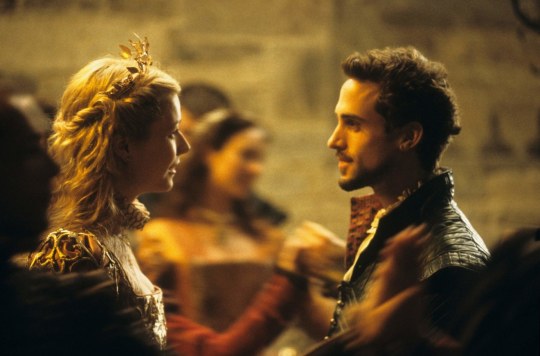
©Miramax/Courtesy Everett Collection
People forget about the competition Shakespeare faced, and we don’t mean the other plays. In the late 1500s, one could go to the theater, or one could go watch some people be executed or a bear be torn apart by dogs. That’s how entertaining Shakespeare’s work had to be! In 1998, this film competed with Saving Private Ryan, Elizabeth, and Life Is Beautiful for Best Picture and managed to come out with the Oscar. What drew the academy to the fast-paced mash-up of Romeo and Juliet with a very loosely interpreted history of William Shakespeare’s life was the film’s ability to capture exactly what Shakespeare did back in his day: the urgency of love and the power of its expression—its ability to consume us and change lives.
. . . to tell your real friends from the sham ones:
Muriel’s Wedding (1994)
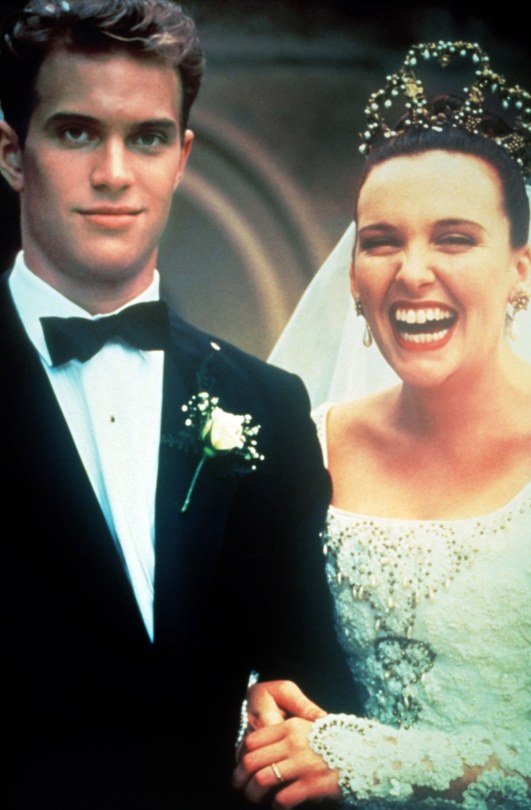
Everett Collection (13649)
Muriel (Toni Collette), a daydreamer and the target of the bitchy girls she considers her friends, wants nothing more than to get out of her small town and away from her awful father, move to Sydney, and get married. When she makes off with her parents’ savings, reunites with a fellow outcast from her town, and is offered the chance to marry a gorgeous South African swimmer who needs a visa, she can make her dreams come true. As much of a coming-of-age story as a rom-com (Muriel may be in her 20s, but she has much growing up to do), this film does a brilliant job of cutting the legs out from underneath our expectations by giving us exactly what we’ve always wanted, and tying us up in the strings attached.
. . . to relive high school (or what you wish high school was like):
To All the Boys I’ve Loved Before (2018)
Netflix’s most popular entry into the rom-com genre (based on the novel by Jenny Han) was for many an instant classic—not least for blessing the world with Peter Kavinsky (Noah Centineo), the Jake Ryan of the Internet era. Lana Condor stars as Lara Jean, a quiet high school kid who relieves her romantic pressures by writing never-to-be-mailed love letters to the objects of her affection—including her older sister’s ex-boyfriend. Until, of course, one night they get sent out. Hijinks—and a fake turned not-so-fake relationship—ensue.
. . . to remind you how much better it gets after high school:
American Pie (1999)
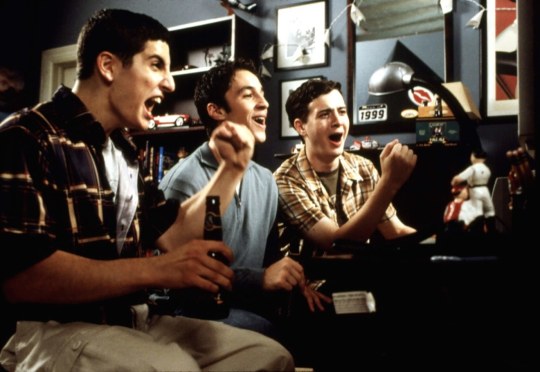
©Universal/Courtesy Everett Collection
A teen sex comedy with a heart of gold, this story of four high school friends determined to have sex before they graduate was the surprise hit of 1999. But underneath all the masturbating with pastry and accidentally ingested semen cocktails, there’s real sentiment to the adolescent boys trying to find their way with women, and vice versa. The reason we can safely call this a rom-com is that, while it doesn’t exactly pass the Bechdel test with flying colors, the objects of the guys’ affections are far from just objects. They have goals of their own we’re brought on board with. The girls aren’t just out for the boys, they’re out for themselves—as disappointingly rare in a rom-com as it is in a teen comedy, and the reason we love this one.
. . . to learn how far to take it:
Rushmore (1927)
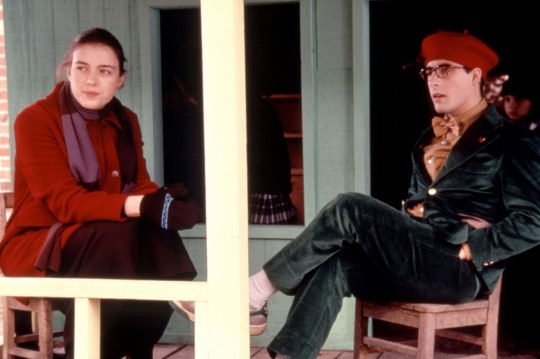
©Buena Vista Pictures/Courtesy Everett Collection
This is Wes Anderson’s most completely stylish movie, and perhaps his best, made before stylized fuckery got in the way of things like writing (like all his best work, this was cowritten with Owen Wilson). Max Fischer (Jason Schwartzman) is a scholarship student at a private school. His academics are dismal, but he’s game for any and all extracurriculars, especially the over-the-top plays he produces and directs. He gets into a contest for the affections of a widowed first grade teacher with local industrialist, and his newfound mentor, Herman Blume (Bill Murray). Several phenomenal executions come together in this film, including the ensemble cast, the just-on-this-side of believable production design, and an absolutely killer classic rock soundtrack. But what pushes it above the rest is the utter drive of both Max and Herman, as love and competition gains primacy over every aspect of their lives. They’re both willing to burn the village to save it, which is simultaneously hilarious to watch and cathartic to anyone who’s ever had a crush.
. . . to locate your other half:
Jerry Maguire (1996)
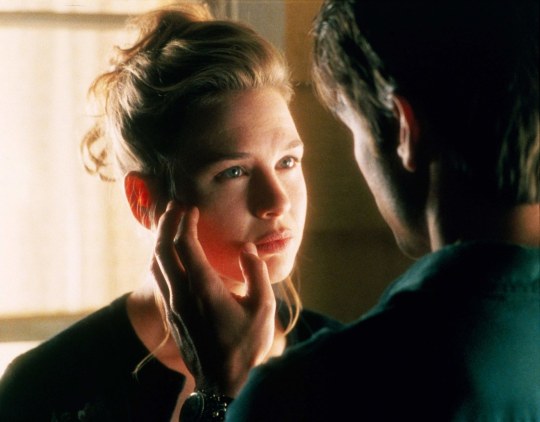
©TriStar Pictures/Courtesy Everett Collection
Cameron Crowe has a couple of films on this list (Almost Famous was close, but ultimately more coming-of-age than comedy) with good reason: He understands people and how they tick. Despite its memorably demonstrative, over-the-top lines, like “You complete me,” and “Show me the money,” this is ultimately a movie about how people really fall in love. Sure, Renée Zellweger loves Tom Cruise from the beginning—it’s a movie after all, and he is Tom Cruise—but what Jerry Maguire gets to is what happens after that first kiss, after the honeymoon period, when we have to learn about the other person as a person, and not just see them and their adorable puppy (or in this case, an adorable son, played by Jonathan Lipnicki) as an escape or alternative from our own lives.
. . . for a dose of realism (and Paris!)
Two Days in Paris (2007)
For sheer hilarious, messy, complicated realism, Two Days in Paris takes the prize. The brilliant and surprising Julie Delpy writes, directs, and stars as Marion, a young Frenchwoman who has brought her American boyfriend Jack (Adam Goldberg) to her hometown en route from a trip to Venice. They struggle through misunderstandings, language barriers, cultural clashes, encounters with Marion’s many ex-boyfriends, and her unruly parents (played by Delpy’s real-life mother and father, actors Marie Pillet and Albert Delpy,) and barely come out the other side. The moral, as Marion paraphrases Jack: “It’s not easy being in a relationship, much less to truly know the other one and accept them as they are with all their flaws and baggage.” It may not be easy, but it’s highly entertaining to watch them try.
. . . to get you through the holidays:
Love Actually (2003)

©Universal/Courtesy Everett Collection
Is this? Not really. But that’s not why we go to the movies. Love Actually is, actually, a rather clichéd Christmas rom-com, but jeez, we love it anyway. How can we not, with this ensemble cast of British romance all-stars (Hugh Grant, Emma Thompson, Liam Neeson, Colin Firth, and Keira Knightley, among others)? The prime minister (Grant) falling for a junior staff member? A quiet suitor in love with the new bride (Knightley) of his best bud (Chiwetel Ejiofor), who is apparently one of three people of color in London? A cuckolded boyfriend (Firth) rebuilding his shattered life with the help of his shy housekeeper? Balderdash. All of it. But it’s irresistible. Come on, what are you, made of stone?
. . . to fall for his funny bone:
Top Five (2014)
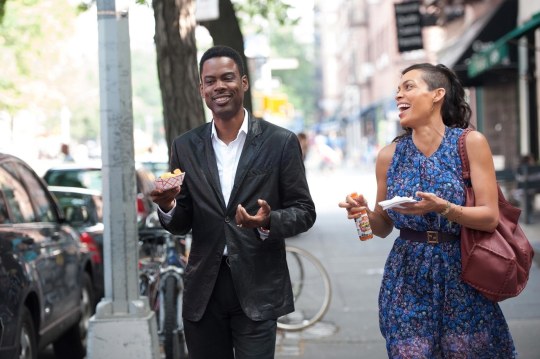
©Paramount/Courtesy Everett Collection
Think of it as Before Sunset meets Funny People, with New York taking the place of Paris. If that notion produces a little eye roll, get those peepers back down, and then on to the screen before you miss some laughs. Rosario Dawson plays a New York Times journalist tasked with interviewing a hugely famous comedian, played by Chris Rock, who is attempting to take his career in a new direction (courtesy of an ill-advised serious film about a Haitian revolutionary). Like Roman Holidaybefore it, this is a film rooted in our society’s placement of, and expectations for, certain figures (a celebrity and a princess, respectively). In both cases, the journalist finds the human being inside of their famous subject, falling for them while trying not to fall for their shtick, or what they represent. As the pair make their way through Manhattan—with visits from Jerry Seinfeld, radio hosts Opie and Anthony, Whoopi Goldberg, and a fantastic supporting job from the ageless Gabrielle Union, playing a reality TV starlet—we can’t help but get on board with their journey.
. . . to look past his neurotic, potentially mentally ill exterior:
As Good as It Gets (1997)
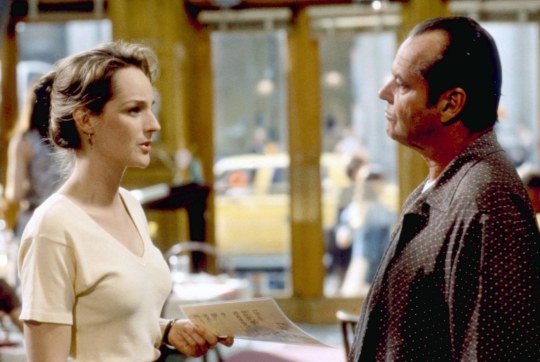
©Sony Pictures/Courtesy Everett Collection
There are few actors who can go toe-to-toe with Jack Nicholson. Director James L. Brooks found a suitable sparring partner with Shirley MacLaine in Terms of Endearment and struck gold again nearly 15 years later with Helen Hunt. Hunt plays a waitress with a sick child for whom Nicholson—a mean, racist, homophobic, obsessive-compulsive writer and her regular customer in the restaurant where she waits tables—has some affection. Bring in Nicholson’s neighbor, a gay artist (played by Greg Kinnear) who has to lean on the Nicholson’s character for help (beginning with care for his adorable dog), add a road trip, and you’ve got yourself one of the most delightful, well-thought-out comedies of the ’90s. The movie takes it time, but it’s to our benefit—Brooks allows us to get to know each of these people, and them each other, intimately, which means when the jokes, and the romance, land, they land hard, and then stay around. (Plus, who among us could resist Nicholson growling, “You make me wanna be a better man”?)
. . . to confirm that, yeah, he’s probably cheating:
Shampoo (1975)

Courtesy Everett Collection
There’s a lot going on in Shampoo—the story of an L.A. hairdresser (Warren Beatty) who is sleeping with, well, everyone (including Julie Christie, who plays a prime target of his affections)—which, at first glance, could just be another ’70s sex comedy. Keep in mind, it’s directed by Hal Ashby, the king of thoughtful, offbeat romances, and was both written by and featured, Warren Beatty, a major voice of the Hollywood Left in the 1970s. The film, released a year after Nixon’s downfall, takes place during on the eve of Nixon’s election in 1968, so there’s a good deal of interplay between the politics and the sexual politics that were in the air as the counterculture died, the pill became mainstream, and the country saw itself in a whole new, darker light. That said, Beatty’s portrayal of the harried, discursive, libidinous George is irresistible even without context, as is the performance given by a young Goldie Hawn, who illuminates every frame—and perfectly counteracts Beatty—with blonde California light, and a heart-melting, downy innocence.
. . . to get you on board with AI:
WALL-E (2008)

©Walt Disney Co./Courtesy Everett Collection
There are more epic Disney romances (one of them is on this list), but none more thoughtful. What we love about this futuristic tale of a little trash compactor, WALL-E, who falls in love with his technological better, EVE, is the considered environmental, anti-consumerist message that suffuses the dystopian love story. With barely a word, only whirrs, between them, EVE and WALL-E convincingly fall in love. His efforts to save her, once the megacorporation Buy-n-Large (their maker) comes for her, is as authentic as Hawkeye’s return for Cora, or Jack’s sacrifice for Rose. Forget Finding Nemo, this is writer-director Andrew Stanton’s Pixar masterpiece.
. . . to justify your May-December romance:
Harold and Maude (1971)

Courtesy Everett Collection
There’s a question that lingers throughout most of Harold and Maude—the story of a death-obsessed young man (he enjoys driving a hearse, attending funerals, and faking his suicide) who falls for a much, much older woman—are these two going to get it on? It sounds sophomoric, but it’s actually essential. Harold and Maude are separated by approximately 60 years; for the movie to hit home, for us to believe that love is truly about what we share, not what we look like or other aesthetic values, we have to believe a genuine attraction has formed. No one prodded existentialism (especially in films deemed “romantic”) like director Hal Ashby, and Harold and Maude is no exception. The darkly funny tale will leave you questioning just what is important to you in your own conception of love—and, moreover, in your life.
. . . to give comic books their due:
Chasing Amy (1997)
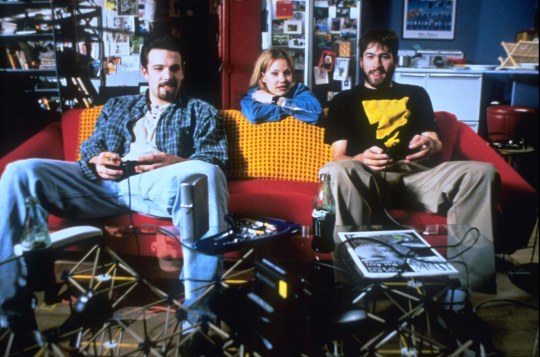
©Miramax/Courtesy Everett Collection
A comic book artist (Ben Affleck) with an inseparable best friend (Jason Lee) falls for a beautiful gay girl (Joey Lauren Adams)—who then falls for him—only to discover he can’t handle it. Comic books? Lesbian conversion? Best buds? Sounds like a romantic comedy made by men, for men. And it is! But Kevin Smith also managed a somewhat nuanced exploration of friendship and art, as well as of contemporary romantic standards in his rejiggering of the love triangle. Simultaneously, at a time when every other joke on Friends involved gay panic, he was portraying three-dimensional concepts of lesbian identity. What could be identified as a typical male-driven fantasy could also be seen as a ’90s Torrents of Spring.
. . . to make you fall in love with your friends:
Reality Bites (1994)
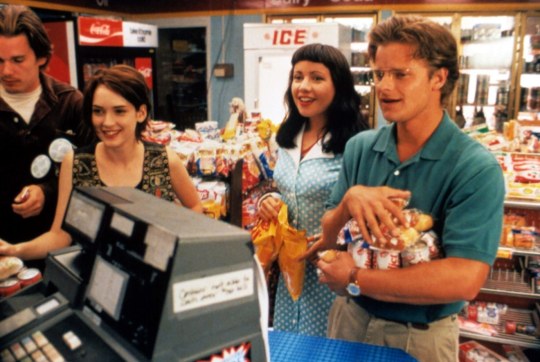
©Universal/Courtesy Everett Collection
In what was then a cult hit and is now a piece of ’90s nostalgia catnip, a post–Edward Scissorhands (and post–Johnny Depp) Winona Ryder plays Lelaina, an aspiring documentarian assisting an obnoxious TV host in Houston. She and grungy, Generation X friends—played by Steve Zahn, Janeane Garofolo, and a simmering Ethan Hawke (who may be more than just a friend)—are just trying to figure out who they are, and what they want in life. In Ben Stiller’s feature directorial debut, he also plays a TV executive whose budding romance with Lelaina and interest in her work brings the real world crashing into their postcollegiate hipster existence. Aside from a nonstop ’90s fashion buffet that is Winona’s wardrobe (mom jeans, crop tops, baby doll dresses, cardigans, men’s shirts, blazers), there’s also love and heartbreak, sex, betrayal, Lisa Loeb, Dickies, pizza, and lines like “He’s so cheesy, I can’t watch him without crackers.” What else do we want, really?
. . . to dance your troubles away:
Grease (1978)
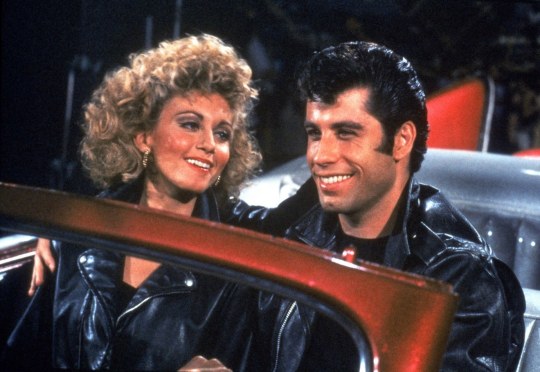
©Paramount/Courtesy Everett Collection
The ’50s nostalgia of the 1970s culminated with this unreal musical about the return to high school for summer lovers Danny Zuko (John Travolta) and Sandy Olsson (Olivia Newton-John). It’s hard for current viewers to understand just how big John Travolta was at the time; the year this film bowed, 1978, the two top-selling albums were the soundtracks to Saturday Night Fever (another Travolta film) and this one. And that was in a year when the Rolling Stones released Some Girls and Bruce Springsteen dropped Darkness on the Edge of Town. In this irresistibly playful film, Travolta embodies the bursting sexuality of the newly emerged teen culture, but at the same time, he’s a tampered-down throwback—we buy him drag racing cars and singing with his gang, the T-Birds, whose rivals are the Scorpions, and making clumsy moves at the drive-in. Similarly, the Pink Ladies, a popular clique headed by Rizzo (Stockard Channing), deliver their wiseacre lines with a fair dose of irony. These skirts know what’s up, and that’s what makes us interested, and invested, in their outcomes. We’re locked in from the first frame: There may be better musicals, but none more fun.
. . . to get you through wedding season:
Four Weddings and a Funeral (1994)
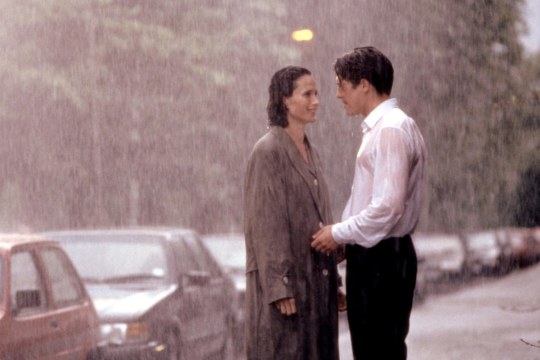
©GramercyPictures/Courtesy Everett Collection
For anyone who’s ever been encumbered by the beautiful, annoying, expensive ordeal that is a wedding, how can we not love a wedding movie whose first pages of dialogue are just the word Fuck? As much as we commiserate, this is ultimately Hugh Grant’s movie. And a little Andie MacDowell’s movie. But mostly Hugh Grant’s. It’s the film that introduced us to his stumbling, bumbling, yet confident Etonian charms and wit, which we’d witness again and again in Nine Months, Notting Hill, Music and Lyrics, About a Boy, and more). The story of Grant and his friends attending their friends’ weddings—and one funeral—perfectly captured the romance of nuptials as well as all the stress, commitment, and emotional . . . what do the British call it? . . . oh yes, bother that comes with that period in your life where your friends are tying the knot. The question this rom-com dares ask is this: In all this wedding madness, can you be the odd man out and still be happy?
. . . to find your prince:
Coming to America (1988)

©Paramount/Courtesy Everett Collection
It’s unfair that Eddie Murphy only has one entry on this list. The guy ruled the ’80s and made some of the era’s great comedies—Trading Places, Beverly Hills Cop, 48 Hrs.—but this is really the only one where the romance narrative rules supreme. In short: Murphy plays the prince of a fictional African nation who is unsure about his arranged marriage, and so heads to what he suspects will be greener pastures in search of his queen. So where better to start that Queens, New York? Essentially slumming it with his best friend (a terrific Arsenio Hall), Murphy’s character finds work at a McDonald’s-type restaurant where he falls in love with the owner’s daughter, a woman who just might fit the bill. It’s a super simple story that elicits big laughs in every scene, but it’s also a clever send-up of class and race that simultaneously owns itself as perhaps the ultimate Reaganite comedy: If you are rich and follow your heart, you can be even richer!
…remind you that life doesn’t always go as planned, but sometimes that’s okay.
Juno (2007)
Life’s not perfect, but it can be most endearing— that’s the takeaway, anyway, from Jason Reitman’s nuanced teen comedy, Juno. Ellen Page gives her breakout performance as the titular pregnant-by-accident teen who soldiers on through high school while preparing to give her baby up for adoption to a painfully needy rich couple (or “baby-starved wingnuts,” as her father calls them.) Juno’s honesty and her backward love story with the adorably nerdy Paulie (Micheal Cera) reminds us of the true meaning of being cool, and that heartache can resolve itself into a tender, resilient future.
. . . to get your boss’s job:
Working Girl (1988)

©20thCentFox/Courtesy Everett Collection
First, consider the cast: Melanie Griffith, Harrison Ford—who owned the ’80s in Hollywood and made this his only rom-com—Sigourney Weaver, Joan Cusack, Oliver Platt, Alec Baldwin (at his douchiest), and Kevin Spacey. Next, look at the director: Mike Nichols—if there is a pantheon for romantic films, he probably has Zeus’s seat. Finally, the shoulder pads; my god, the shoulder pads. Were doorways made wider in the 1980s? Adventures in Babysitting aside, this movie is really as feminist as mainstream movies got in the ’80s. Melanie Griffith plays Tess McGill, a wily business school graduate working as a secretary at an investment bank with such memorable one-liners as “I have a head for business and a bod for sin.” When her boss (Weaver) steals her idea for a merger and then ends up out of commission (temporarily bedridden after a ski accident), Tess rises to the occasion: scheming with the support of her friends and maybe-lover (Ford), conniving, flirting, and using some good old-fashioned elbow grease to outwit her superiors, beat the boys, and claim the position she’s rightfully earned. Griffith is miraculous (one critic compared her to Marilyn Monroe; younger viewers might see a mold for Alicia Silverstone’s Cher), taking a role that could have just been “cute” and elevating it to nuanced and beguiling. That’s what this film is—so much so, we’ll forgive you if, after watching it, you suddenly have a soft spot for shoulder pads.
(C)
2 notes
·
View notes
Text


Katharine Hepburn & Cary Grant (Holiday, Bringing Up Baby, The Philadelphia Story)—They're both unspeakably hot and putting them together only makes them that much hotter. Because physically attractive people are WAY hotter when they're also incredibly funny, and both of them are. They play off each other to perfection, and I could eat them both ❤️
Greta Garbo & John Gilbert (Flesh and the Devil, Love, A Woman of Affairs)—their kiss. their kiss their cigarette the darkness the night the kiss. they make me insane they make me insane [video underneath the cut]
These are the quarterfinals of a mini tournament. Each poll lasts for a week. Please reblog with propaganda for your favorite hot couple. To vote in all the polls, click here.
[additional propaganda submitted under the cut]
Hepburn and Grant:

Truly two of the hottest people ever to grace our screens and when you put them together, it's volcanic. They are totally magnetic on screen together, with the perfect love/hate chemistry. The ultimate 'you drive me crazy' couple, no one is doing it like them.

They are delight and joy and ALSO insanely hot together. Friendships have ended over the ship war of The Philadelphia Story, and you know what? Valid.

They are the hottest couple because they are clever, witty and beautiful. They spark off each other magnificently.

I feel like they’re almost too obvious to bother submitting but I’ve made that mistake before so Cary Grant and Katherine Hepburn. I present Bringing Up Baby and The Philadelphia Story as evidence, your honor

Perfect onscreen match in some of the greatest romcoms ever. My, they were yar!

Cary Grant & Katherine Hepburn! They're my favorites! Dapper & ridiculous both!

I'm sorry, that's not a very romantic pic, but I had to include the serenading the leopard
and the fluffy bathrobe!
youtube
Garbo and Gilbert:
youtube
165 notes
·
View notes
Note
1, 26, 28, 52 :)
Salut! Comment ça va?
1 – A movie you’ve seen most times in cinema. You know, I don’t think I’ve ever seen a movie more than once in cinema.
26 – Favorite movie characters. OK this might get long but
Hildy Johnson (Rosalind Russell - His Girl Friday)
Nick & Nora Charles (William Powell & Myrna Loy, the Thin Man series)
Bunny Watson (Katharine Hepburn - Desk Set)
Hazel Flagg (Carole Lombard - Nothing Sacred)
Sugarpuss O’Shea (Barbara Stanwyck - Ball of Fire)
Cosmo Brown (Donald O’Connor - Singin’ in the Rain)
Grandpa Vanderhof (Lionel Barrymore - You Can’t Take It With You)
Liz Imbrie (Ruth Hussey - The Philadelphia Story)
Lisa Carol Fremont (Grace Kelly - Rear Window) I don’t even like Grace Kelly but this was an amazing movie and a very well-written character
Lily Mars (Judy Garland - Presenting Lily Mars)
Oscar Jaffe (John Barrymore - Twentieth Century) this guy is a major jerk but he has some great lines
Louise “Babe” Bennet (Jean Arthur - Mr. Deeds Goes To Town)
Nina Ivanovna "Ninotchka" Yakushova (Greta Garbo - Ninotchka)
Sabrina Fairchild (Audrey Hepburn - Sabrina)
Louis Renault (Claude Rains - Casablanca)
Gilda Farrell (Miriam Hopkins - Design for Living)
That’s all I can think of for now but I’ll probably think of 20 more 5 minutes after I post this.
28 – Best remake. The 1954 version of A Star is Born! I’m still mad about the Judy Garland Oscar thing. High Society has great music (I feel like that’s bound to happen when you have Louis Armstrong, Bing Crosby and Frank Sinatra together in one movie) but it just doesn’t compare to The Philadelphia Story.
52 – Favorite pre-code. I’m not terribly well-versed in pre-code cinema, but I’d say Design for Living is my favorite. I love Miriam Hopkins.
Thank you!
(movie ask game)
4 notes
·
View notes
Note
What are your fave romcom movies? And any that you like and would recommend? Thank you!
What’s so great about this ask is that you’re about to witness how ridiculously vast my love of romcoms extends, because I have so many recs! You’ve unknowingly opened Pandora’s Romcom Box, nonnie. Anyone who knows me - either online or irl - has been subjected to my chick flick voraciousness which knows no bounds. (AKA I binge Hallmark Channel on the regular, too.) There’s a reason my friends jokingly call me Romcom Ashlee haha.

Anyway, here’s a list of a bunch of my favorite romcoms in no particular order. I included some old movies as well because they’re amazing and I have no chill:
-Any Jane Austen adaptation in existence (seriously, I have an Austen obsession problem)
-You’ve Got Mail
“I love daisies. They’re so friendly. Don’t you think daisies are the friendliest flower?”
-When Harry Met Sally
FRIENDS TO LOVERS GOLD !!!!!!!
-Sleepless in Seattle
-French Kiss
This stars Meg Ryan and Kevin Kline. It’s not as famous or well-known as her others, but I LOVE IT TO PIECES.
-Sweet Home Alabama
There’s a running joke about this movie in my family. I pretty much quote it from start to finish and drive everyone mad. I also went through a phase for a few years as a young teen where I’d watch it like once a week, and somehow every time my uncle would pop home for a visit over the holidays I’d have it on. So, now, almost 2 decades later, he still teases me with a “we’re not going to watch Sweet Home Alabama again, are we?” any time he visits.
Considering I just wrote a Klaroline fusion for this movie it’s safe to say my obsession lives on! 😂
-10 Things I Hate About You
-While You Were Sleeping
The cast for this movie is incredible. It’s one of my all-time faves.
-Laws of Attraction
-She’s All That
-Fools Rush In
“You are everything I never knew I always wanted.” *over here crying about it*
-Ever After
-Sixteen Candles
-Crazy Stupid Love
-Clueless
-Austenland
-P.S. I Love You
I cry every time I watch this movie. Never fails.
-The Notebook
-He’s Just Not That Into You
-Pretty In Pink
-27 Dresses
-Never Been Kissed
Michael Vartan was one of my first celeb crushes and I REGRET NOTHING.
-Sabrina (with Audrey Hepburn, Humphrey Bogart, and William Holden)
-Gidget (with Sandra Dee and James Darren)
-The Philadelphia Story (with Cary Grant, Katharine Hepburn, and Jimmy Stewart)
-It Happened One Night (with Clark Gable and Claudette Colbert)
-The Shop Around the Corner (with Jimmy Stewart and Margaret Sullivan)
You’ve Got Mail is loosely inspired/based off this film. It’s a modern adaptation of it with a P&P twist
-Where The Heart Is
-Much Ado About Nothing
It’s a period Shakespeare adaptation but IDC IT’S GLORIOUS.
-Chasing Liberty
It’s with Mandy Moore and Matthew Goode and MORE PEOPLE NEED TO SEE IT because it’s adorable. I convinced @klarolinekolvina to watch it the other day. I’m so bummed the rarely play it on TV anymore.
-Bridget Jones’s Diary and Bridget Jones’s Baby (those are my 2 favorite movies even though it’s a trilogy)
-Runaway Bride and Pretty Woman (aka it’s impossible to go wrong with Julia Roberts and Richard Gere)
-Notting Hill
-Love Actually
-The Holiday
-Forgetting Sarah Marshall
-13 Going On 30
-How To Lose A Guy in 10 Days
-Lucky 7
-Something’s Gotta Give
-My Big Fat Greek Wedding
It’s so cute, plus Gus is a delight:

-My Best Friend’s Wedding
-The Wedding Singer and 50 First Dates (with Drew Barrymore and Adam Sandler)
-The Princess Diaries 1 & 2
-The Princess Bride
-Four Weddings and a Funeral
-Along Came Polly
-500 Days of Summer
-Silver Lining’s Playbook
-Two Week’s Notice
-Letters to Juliet
-Sliding Doors
-Only You
It’s with Marisa Tomei and Robert Downey Jr. I feel like it gets swept under the rug a lot, but I love it.
So I love the fake dating/relationship trope. Here are a few of those…
-To All The Boys I’ve Loved Before
This has been all over my blog since I first watched it over the weekend. It’s a trend which will continue because it’s beyond precious.
-Drive Me Crazy
-One Small Hitch
This used to be on Netflix and I rewatched it so many times that were somebody tracking my viewing history he/she’d be all, “Girl, do you want anything else? Ever?”
-My Fake Fiancé
-Can’t Buy Me Love
-Just Go With It
Honestly, I never would’ve thought to pair Adam Sandler and Jennifer Aniston together but they have good chemistry.
-The Wedding Date
-The Proposal
…Okay, I will stop inundating you now. *angel halo* Rest assured I could go on for ages. I’m probably going to kick myself for forgetting something huge but this is a pretty good list.
#anonymous#replies#the loveliest of lovely people#ashlee bree talks romcoms#i hope this is helpful#and not you know...intimidating#but there are so many good romcoms haha#idk why i annotated some of these#but i just couldn't help myself?
14 notes
·
View notes
Text
Rules: tag 9 people with excellent taste
Colour(s) I’m currently wearing
Mostly white - I’m wearing my bathrobe. My mom got it for me and it’s great. It’s not the softest but it’s good and it’s got cool blue and grey horizontal stripes on the bottom. Normally it’s very frustrating for her to try to get clothing gifts for me, but she hit the nail on the head with this one.
Last band T shirt I bought
I’ve never bought a ‘band’ t-shirt. The artists I really love don’t have much in the way of t-shirts and if they do, they look really corny. Like I’m not gonna get a Streisand t-shirt and look like some middle-aged empty-nester out grocery shopping.
Last band I saw live
I guess our evening Jazz Ensemble - it’s professional adult musicians - at my school’s Jazz Ensembles concert. They’re great. As for non-school performances, I think? the last concert I went to was a Brian Setzer concert at the Hollywood Bowl with my mom a while back.
Last song I listened to
youtube
I tried listening to some contemporary pop from the Love, Simon (2018) soundtrack today and it was really difficult so now I’m at the computer enjoying some tumblr-time and listening to my most-chill and most-favorite Doris Day album.
Lipstick or chapstick?
I used lipstick once for my Katharine Hepburn halloween costume last year and - tbh lipstick is so much work - makeup in general. Like it would be fun to be a girl and wear dresses and be super pretty and stuff - but wo-MAN it’s so much work!
So chapstick. The tube I use is some Burt’s Bees pink grapefruit that I really love. This might sound weird but I only have it because a boy I had a small crush on once asked me to hold it while he changed clothes and forgot to collect it from me..
Last movie I watched
I went to the movies last weekend with @adamsberg and another one of my best friends and saw Love, Simon (2018). I really really really really loved it.
I hadn’t even heard of it until a few weeks ago I saw a trailer on YouTube, but I thought it looked great and it was everything I hoped and more. I have this soft spot for angsty contemporary teen dramas like this [The Fault In Our Stars (2014) and The Perks of Being a Wallflower (2012) are also in this micro-genre]. While I love my classics, I also love these great movies that are being made here and NOW! Sometimes I feel apart from the rest of the world - and not in a good way. I wasn’t friendless in high school - but I wasn’t anywhere near as close to any of my friends as any of these movie teens are... as accepted and loved as I am to/by an amazing, small, group of my friends now. I have no horror stories, but I don’t have very many stories and that’s just it - I could have had so much more, but I didn’t. Part of it was because I wasn’t out yet and this film so wonderfully explored that. I highly reccomend it - and not just for the good plot, it’s hilarious and an overall great experience.
Last 3 TV shows I watched
911 (2018-present)
Sometimes my mom’s taste in first-run television is pretty bad (NCIS stopped being good like a decade ago) but in this case I am totally on-board. Angela Bassett [WAIT HOW IS SHE 59???????] is an inspiration (I WANT HER CHARACTER’S HOUSE!), the writing and production values are generally very good - it’s a solid, interesting show. Still, can anyone tell me what the deal with that middle-aged white lady (who’s a few years younger than Angela Bassett but lowekey looks 20 years older) who dresses like a suburban mom trying to dress like her teenage daughter - like what’s the deal with her dating that guy in his 20s?
Frasier (1993-2004)
My mom and I watch this show somewhat regularly as it’s on like every flippin’ night on the scourge that is the Hallmark Channel (generally decent reruns, but I hate the channel itself and their original programming is complete trash). In a lotta ways I really love it - it’s hilarious, witty, sophisticated, adult, and has the power to create a real poigniant moment like you rarely see so fully-realized in sitcoms.
It has its issues though. Frasier and Niles (especially in early seasons) can get annoyingly whiny/snobby. I get that their characters are kinda built around that, but there’s a point at which they take it too far and it becomes disengaging. Also it’s a super white-people-centric show (I wonder why Hallmark likes it so much...) so diversity could be a lot better. Still, it’s generally a high-quality program.
Gosh I don’t remember what else I watched last. I haven’t had a lotta TV time lately so Imma use this opportunity to plug...
Stranger Things (2016-present)
One’a my best friends, Grace, introduced me to this show and I absolutely love it. The period’s really well done - not just accurate, but alive and real and relatable. The acting and casting is great. Winona Ryder is a treasure and I have a shameless crush on Joe Keery’s amazing hair and the person it belongs to. The scoring is effective, interesting, and very different from the kind of film music I usually am exposed to (I’m really making an effort to expand my horizons beyond classic orchestral sounds lately). The production values are great - it’s just an amazing show.
Last 3 characters I identified with
1.) Simon Spier from Love, Simon (2018)
While there are some things about him I definitely don’t identify with (message me personally if you wanna know specifics- I don’t want to spoil anything), I very much identify with his coming out story and coming to terms with his sexuality on his own terms.
I feel like there are people who will criticize the film based on Simon’s extreme normalcy - like he’s honestly a fairly stock white, middle-class, suburban teenage boy and, aside from his involvement in theater and ‘ya know liking boys he doesn’t do much that would be considered “gay” - but that’s kinda the point of the film. Being gay is just something that is and anyone can be gay - they’re not weird or whatever just for being gay - that was one of my fears - that I would be treated (or even just feel like) some strange unwelcome outsider just because of this one thing.
I had a long conversation tonight with an older kinda mentor’y friend of mine (though I’m more of the mentor) who’s gay and who was having a really rough night. Among the lotta things he said was that all gay men cheat that there’s no true monagomous love in the gay community and like lightning I shot him down with a fervor and wisdom and riteousness that would make Kate proud (wayto blow my own horn).
That’s the exact kind of idiotic prejudice that makes people afraid to come out in the first place. It’s fear that kind of small-minded judgmental behavior which was most responsible for me remaining closeted in high school. It’s a hard thing to explain to someone who hasn’t been there because after you’ve been through it, it can kinda feel like nothing afterwards - all this fear and conflict and it’s really kinda purposeless. You find that people still love you and the people who don’t are really not good people anyway. I wish I had come out in high school, I could have been happier. But I am happy now.
2.) Tracy Lord from The Philadelphia Story (1940)
Dedicated followers may remember I rewatched this one a few wks ago on what would have been a date with me and my crush until he cancelled. That time I saw Trace and Kate herself through lenses less tinted than ever before, but still she’s there in all her glory and all her not-glory. Tracy is riteous, despises drinking and gets very contemptful of what she views as weakness, such as her ex-husband’s drinking problem or Mike’s cynical view of the rich. I am often that way (in large part due to the second-generation effects of my mom’s own east coast catholic upbrining) which has it’s merits certainly - that specific east coast almost ‘puritan’ toughness (I think Dick Cavett, said Bette Davis and Kate both had it) can be a tremendous source of strength and sense. It can also easily become cold, prudish, snobbish, and condesending. I have tried to unlearn these aspects and I am still working on that. This is kinda what Tracy’s arc is about, learning to be human and be loved and to love others.
Though it’s not as recent, the next one that comes to mind is
3.) Nancy Wheeler from Stranger Things
I already mentioned that my friend Grace got me into this show, but I didn’t mention that I only ever watch it with her. Not that I don’t really love the show - I do - but I like saving it for when we’re together - it makes it more special.
Anyway, more than perhaps any other single character on that show, I identify with Nancy Wheeler. Regular suburban teenager who’s better - not just a regular suburban teenager - she’s aware of the sort of suburban ‘don’t do much with your life ‘cept rasie kids [not that there’s anything wrong with having and raising kids, that’s wonderful] trap. I also found the episode with her at Steve’s house really resonated with me. Barb telling Nancy “this isn’t you” really got to me. Part of me still has an internal ‘Barb’ that kinda ties in with the whole east-coast ‘puritan’y’ morality but there’s also the part of me that wants to be young and just a person and do cool things with my friends and kiss boys and watch great angsty contemporary teen dramas. They both have their merits and drawbacks - the young side has life but can be stupid and reckless - the old side is wise and careful, but can be paralyzing and stagnating.
Books I’m currently reading
I have a whole slew of books checked out that I’m supposed to be reading (for my own enjoyment).
The Unanswered Question: Six Talks at Harvard by Leonard Bernstien
I loved his The Joy of Music so I figured I would like this too. He’s a great music lecturer. I’m only like 5 pages in so far.
Elizabeth Taylor: A Private Life for Public Consumption by Ellis Cashmore
This one I’m a little further on, though most of that was just the introductory timeline of her life with a key notating each illness/medical episode, marriage/actual or rumored romantic relationship, and neaar-death experience (her life is such ‘drama’).
I also have a book about motifs in Hitchcock’s films with the car picnic from To Catch a Thief (1955) on the cover. I haven’t started reading it yet.
And I have some book about Lerner & Lowe, the duo responsibly for My Fair Lady, Camelot, etc...
-------------------------------------------------------------------------------------
This was really really wonderful to participate in. Thank you, my amazing friends, so much for tagging me @adamsberg and @in-the-key-of-d-minor. I’ve enjoyed lots of asks and tag games, but I’ve never felt this good about one before...
I tag
@hildy-dont-be-hasty @tyronepowerbottom @reluctant-martyrs @thevintagious @littlehappyrock @n2ninvisiblegirl @solasdisapproves @hepburnandhepburn and @her-man-friday
If I didn’t tag you but you wanna participate, have at it!
What’m I gonna do, fire you?
#personal#asks#tag game#love simon#gay#the philadelphia story#katharine hepburn#stranger things#doris day#andre previn#jazz
4 notes
·
View notes